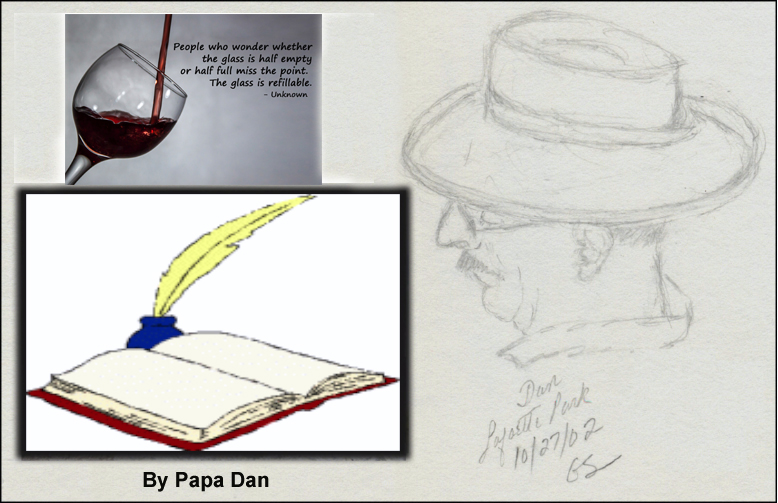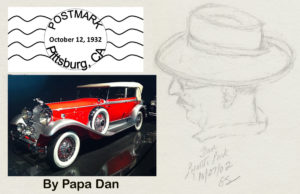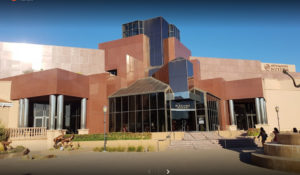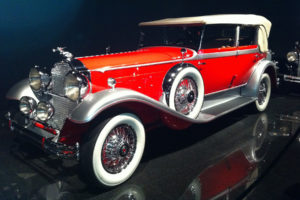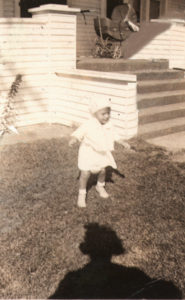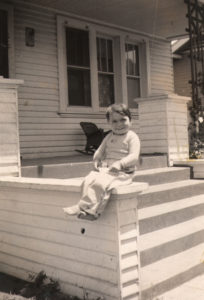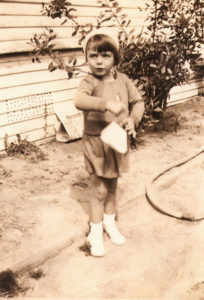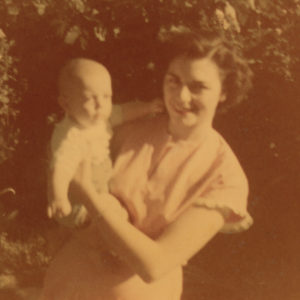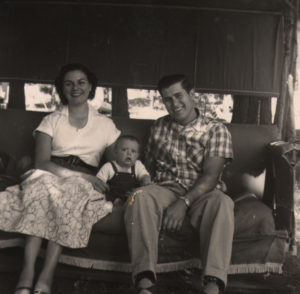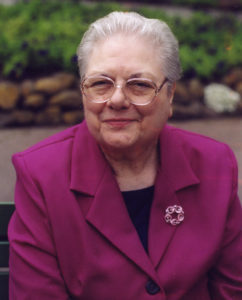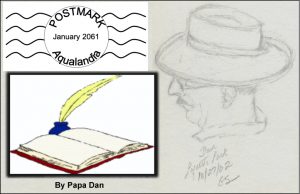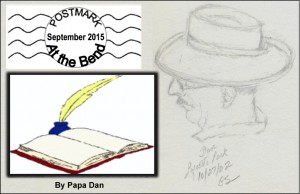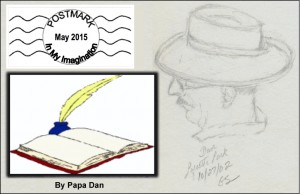Archive for Fiction
Let Me Help
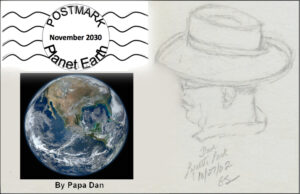
“Don’t discount the power of fiction
to change the world;
it has happened over and over
throughout our history.”
Click here to download a PDF of this post:
Let_Me_Help_Final
City On the Edge of Forever
The television series “Star Trek” was a collection of 79 time- and space-travel stories that appeared from 1966 to 1969. As a teenager, it was my favorite TV show. The episodes were set in the future — some time in the 2200s. In the episode titled “The City on the Edge of Forever,” written by Harlan Ellison, the Starship Enterprise is flung back in time from the 23rd century to the planet Earth in the year 1930. Captain Kirk, Mr. Spock, and Dr. McCoy find themselves in New York City, which is suffering in the depths of the Depression. They meet Edith Keeler (played by Joan Collins) who is in charge of a soup kitchen set up to feed the (many) hungry. Captain Kirk, of course, falls in love with her. She senses that Captain Kirk and his two companions are distressed about something. She, of course, has no clue that they are stuck three hundred years into their own past, not sure how they are going to get back to their own time. They have this conversation:
Edith Keeler: Why does Spock call you “Captain?” Were you in the war together?
James T. Kirk: We served together.
Edith Keeler: And you don’t want to talk about it? Why? Did you do something wrong? Are you afraid of something? Whatever it is, Let Me Help.
James T. Kirk: Let Me Help . . . A hundred years or so from now, I believe, a famous novelist will write a classic using that theme. He will recommend those three words even over “I Love You.”
Edith Keeler: A century from now? Who is he? Where does he come from?
Where will he come from?
James T. Kirk: Want to hear a silly answer?
Edith Keeler: Yes.
James T. Kirk (points to the sky): A planet, circling that far left star in Orion’s belt, see?
— City on the Edge of Forever, Earth, 1930 (aired on TV April 6, 1967)
Captin Kirk tells her that this novel “changed everything.” From our perspective here in the 21st century, we realize that, if this novelist published his story about 100 years from that day in 1930, it would appear some time in the next few years here in our own twenty-first century. ………… More on that later.
The plot of this Start Trek episode itself focused on the dilemma facing the time travelers in light of “The Prime Directive,” also known as “Starfleet General Order #1.” The “noninterference directive” prohibited Starfleet crews from doing anything that interfered with the internal and natural development of alien civilizations.
While trying to figure out how to get back to their own time, Spock uses his tricorder to recreate the “actual” history of the time they are visiting and discovers that Edith Keeler was supposed to die that year in a traffic accident. Examining an altered timeline accounting for their interference, Spock learns that, if her life was spared, Keeler would go on to found a pacifist movement, causing the United States to delay its entrance into World War II and allowing Nazi Germany time to develop nuclear weapons, with which they will conquer the world. Kirk admits his love for Keeler, and Spock answers that Keeler must die in order to prevent millions of deaths.
Kirk is faced with a harsh reality: Edith Keeler must die in a traffic accident — which they could easily prevent — in order for history to proceed the way it must. So, at the climax of the episode, we see Captain Kirk restraining Dr. McCoy, preventing him from saving her life, to save the future of the human race — that is, to save us. Dr. McCoy, of course, doesn’t understand and shouts, “Do you know what you just did?!” Spock answers, “He knows, Doctor, he knows.” After that scene, a heartbroken Captain Kirk and his crew return to the Starship Enterprise, and he orders them to “get the hell out of here” — back to their own time.
Well, What About the Novel? Is this Story About Us?
Fifty years ago, in addition to the time-travel and space-travel aspects of this story, the tragic love story of Edith Keeler and Captain Kirk appealed to me. For those of us who live in this time of gathering turmoil here in 2019, a novel “expected” to appear about a century after 1930, titled “Let Me Help” — a novel that we are told “changed everything” in OUR time — might pique our interest even more. We might wonder, as the Edith Keeler character asks about this novelist, “Who is he? Where does he come from?” And, most important to us, what necessary changes would such a novel inspire? Looking ahead to OUR next few years leading up to 2030, presumably the aftermath of the current struggle, we can imagine what changes will be needed and how the novel, and its title, might inspire those changes.
Looking Ahead: A Novelist Writes in the Year 2030 — What might he say?
In the year 2030, an increasing number of people are likely to realize that a lot of very serious problems can be traced to some societal changes that began around 2016. A fictional novelist takes up his pen and writes a story — a piece of fiction — about the beginning of a small movement called “Let Me Help.” In the novel, a small group of friends, about a dozen or so, start meeting in a bistro in the Mission District of San Francisco, initially to whine about how bad things had gotten and how ineffective the government had become in addressing a series of growing problems — local and national. One afternoon, this group gathered around a table in a bistro and made a list of their observations:
• While the unemployment rate has reached a new low, the number of people under-employed (i.e., working full time at one or more jobs but not earning enough to afford a decent American life) is increasing. Why? With the diminishing influence of labor unions in many parts of the country, large numbers of workers cannot afford basic health care, childcare, or home ownership.
• Many of our kids, even in otherwise middle-class communities, go to school hungry. Some communities have programs that provide healthy school lunched, but those programs are few and far between. In spite of the strength of some parts of the economy, the homeless population, noticeably in San Francisco, has dramatically increased.
• More and more employed Americans are forced to live farther from their workplace, lengthening the work day, clogging freeways, and adding to air pollution.
• Increased use of fossil fuels continued its indisputable harm to the economy and health.
• In many parts of the country, financial support for public schools, which used to be an international source of pride for America, has diminished. As a result, test scores, especially in science and math, have declined and fallen behind those of other developed nations. Ignorance of American institutions is increasing. Basic job skills are in decline.
• In many parts of the country, a rash of natural disasters — hurricanes, tornadoes, floods, earthquakes and wildfires — have destroyed communities near and far, leaving large numbers of families without the means to rebuild their lives. In some cases, the need is temporary. In some cases, the need is ongoing.
At the end of the second chapter of the novel, the group reviewed their list, shaking their heads at how far everything had fallen from the hopes they had all grown up with. One member of the group decided to post their list on a couple of social media platforms, along with some local examples of ways that San Franciscans were being harmed by these issues. His post ended with a public invitation to join a small group planning to organize efforts to help locals who are affected by the lack of effective government attention to these and other local issues. The group gave themselves a name “Let Me Help” and scheduled their next meeting on a Saturday afternoon in two weeks. They hoped to acquire a handful of new members from their social-media invitation and figured that they could organize themselves to help out at some local soup kitchens and homeless shelters. Maybe they could organize tutoring to increase job skills and help people apply for jobs. Pleased with themselves, they ordered a round of drinks and turned their attention to a ballgame on the big screens.
‘Let Me Help’ Becomes a ‘Thing’
Two Saturdays later, the dozen or so people who had met to whine and make their list came back together to plan some next steps in their little project. One by one, as they approached their favorite bistro, they were stopped in their tracks in amazement. Traffic on the nearby streets was clogged. Once they were able to walk up to the bistro, they found a crowd of several hundred people had filled the sidewalks on both sides of Van Ness Avenue and bulged out into the street blocking traffic. People wanted to know where “Let Me Help” was meeting and they wanted to sign up to join the effort. Some were a bit annoyed that there seemed to be a noticeable lack of organization for such an important project.
What To Do?
This little group had not expected anything like this. After stumbling round awhile, they were able to herd the crowd over to the public square next to the BART station and one of them stood on a bench and spoke. It didn’t take long to discover that these people who responded to the online invitation were attracted to the idea that something could be done to mitigate the inadequacy of government to address the problems that had emerged in recent years, and they were hungry for an opportunity to help. After some discussion, a sign-up list was created with contact information and promises were made to set a new meeting date (at a larger venue) and organize some specific committees to address some of these issues at the local level.
To make a long story short …
• Committees were formed over the next month.
• Groups collected food donations and delivered them to several homeless shelters and soup kitchens in The City. Some went to a City Council meeting and petitioned the City to have the “Let Me Help” group registered as an official local charity. Arrangements were made for the group to meet with City officials about some long-term proposals to combat hunger and homelessness in San Francisco.
• Two local grocery stores pledged to start an ongoing program of excess food deliveries. A local hotel owner pledged a sizable donation; and a small facility was identified in one of his buildings to store supplies and eventually, serve members of the public.
• Using social media, “Let Me Help” groups were formed throughout the Bay Area with similar results in six cities.
• Stories appeared in the local newspapers and reported on a local TV station. The local story was picked up in the New York Times, and later CNN, describing the organizational model initiated by the small SF group.
• Within five months, copy-cat “Let Me Help” groups were formed in 25 cities in ten states. Local newspapers spread the word, initiating some competition among cities — rising to the level of a twelve state capitals — you know “Our state knows how to do this better than … “ and so it went, until …
• A low-level State Department official in Washington D.C. brought the story to the attention of the Secretary of State, who …
• At a meeting in Vienna of the newly-constituted Group of Seven Plus (G7+3) Alliance, the U.S. took the lead on a project to partner with ten national government agencies and make “Let Me Help” an international agency for supplying food, temporary housing, and employment support for citizens of all participating countries.
• The United Nations met in New York to discuss making “Let Me Help” a UN-sponsored, internationally recognized entity for standardizing border-crossing protocols and immigration support for all UN member nations. An interesting by-product of this effort was that attention was drawn to large numbers of people — both citizens and immigrants — in member nations who are living without basic necessities. The program expanded and many lives were improved.
The “Let Me Help” Novel Tops the ‘NYT Best Seller List’ for the Ninth Week
Let’s not forget that all of this takes place on the pages of a novel. A very good novel … just a work of fiction … OK, a novel that hasn’t yet been published …. But, in the novel, with such an uplifting and optimistic work of fiction discussed on talk shows and in literary magazines around the world, something interesting happened. A well-known former U.S. First Lady made the book the topic of her first speech to the world in her capacity as the newly-elected Secretary General of the United Nations. She asked, “Is it possible that this story could become OUR story? You know — you and me, all of us? Do we have what it takes to become the change we all have longed for since, well … you know … since we seem to have paused our world-wide commitment to … uh … you know, doing the right thing?” Do we have the humanity? If your answer is yes. Let Me Help. Here is how I’d like to help … “ She made a list of suggestions of programs that government can initiate and a list of existing programs to which individuals around the world can support.
And so it was …
And, of course, it was fiction — just a story in a novel … a novel to be written in our time — as foretold in a Star Trek episode that takes place in our future … and in our past … that we saw fifty years ago.
Just as Captain James T. Kirk said in a New York soup kitchen back in 1930 … and … well, will say in a couple of hundred years as captain of the Starship Enterprise, the novel “changed everything.”
Everything.
So, what about us?
I bet we could generate a list of existing programs that will accept our small donations that can make a difference for lots of people who need help. Here are just a few:
• World famous Chef Jose Andres has an organization called the World Central Kitchen. He brings his “kitchen staff” around the world to places devastated by earthquakes and hurricanes and set up kitchens where he has fed thousands of people who had lost their homes. His motto is: ”Wherever there is a fight so that hungry people may eat, we will be there.” Anyone can visit his website (https://wck.org/ ) and make a donation.
• Grace Cathedral in San Francisco (we go there for their Christmas music) co-sponsors The Winter Interfaith Shelter in collaboration with the San Francisco Interfaith Council and run by Episcopal Community Services. The Interfaith Shelter provides dinner, breakfast and a dry place to sleep for 60-100 homeless men during the coldest and wettest time of the year. https://gracecathedral.org/winter-interfaith-shelter/
• We have a neighbor who invites us to donate needed items to the local SPCA, especially to temporarily take care of animals who have been orphaned by the wildfires in northern California. Almost everyj town has one and they accept things like bedding (any used sheets, blankets, towels), newspapers, kitty litter, pet food, and more. My old friend Lew (OK, don’t tell him I said he’s old) actually volunteers at his SPCA in Monterey.
• The Alameda County Food Bank provides food for 116,000 people who turn to them each month (more at Thanksgiving). Take a look at www.accfb.org. A $25 donation will help to provide $175 worth of food.
Dear Readers:
—-> I bet you have a favorite charity to recommend that makes life better for those who need help. If you do, send me your “Let Me Help” suggestions and I’ll spread them around to our ConVivio readers. I bet we can help.
—-> Which of us will step up and write the novel that could change everything? You have ten years — plenty of time, right?
![]()
A “Tense” Meeting
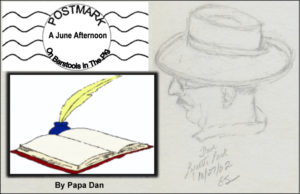
“The Past, The Present, and The Future
walk into a Bar.
It was tense.”
— A very old, ungrammatical, grammar joke
Click here to download a PDF of this article:
ConVivio_Tense_Meeting
= = = = = = = = = = = = = = = = = = = = = = = = = = = = = = = = = = = = = = = = =
The Past and The Present Walk Into a Bar – Their Companion Is Late
I’m sitting at my usual barstool at The Flying Pig, a friendly bistro in San Francisco’s Mission District, sipping a Sonoma County Zinfandel and enjoying my usual BLT (on Focaccia with extra bacon), when two people walk in and take two of the stools at the end of the bar to my left. The guy appears to be in his late fifties wearing dress pants, a sport coat, a vest, and a fedora. His companion, perhaps in her thirties, is wearing casual slacks, a scarf, and a sweater. He places his hat on the bar, looks around and confirms, “Yep, she’s not here yet. As usual, with her, it’s easier to settle on the place to meet; but the time is often a problem for her.” His companion agrees. “That’s the trouble with ‘The Future,’ ” she said; “She usually arrives later than we expect.”
The bartender greets them with his usual enthusiasm “Welcome to The Flying Pig. My name’s Will. I’m glad you could visit us. Can I pour you something? We have some very interesting choices!” After listing some of their most recent acquisitions — the latest up-to-date local craft beers — she orders a 2019 Founders IPA and, after some discussion, he orders a 2012 Napa Valley Cabernet.
I can’t help overhearing their comments about the companion they were waiting for. The gentleman says, “Sure would be nice knowing what to expect from her. I mean, she’s not always a surprise; but we just never know until he shows up, you know?”
His companion agrees. “Right, I know she’s from “The Future” and all; but I think she gets it wrong most of the time. Some of the things she has told me about … you know, ‘The Future,’ are just not believable. Others have just not turned out the way she warned. Last time we got together she had told me she was going to take a taxi, but she ended up arriving in something that didn’t even have a …” William interrupts and brings their drinks and a menu, “You were right, sir, about that Cabernet. It was very popular in its day and I’m surprised we still have some. It was hidden behind something … uh … more recent. Hasn’t been much call for it lately. Our French Dip would go well with it, as would the Classic Roast Beef Sandwich. And, of course, everything goes well with your IPA, … uh … ma’am.“
“They call me Alpha. He’s Janus.” She whispers to Will, “I call him ‘Tom.’ “T” “O” “M” That’s short for ‘The Old Man’ .”
“Uh … of course.”
Janus (aka “Tom”): “I’ll have the French Dip on sourdough. It was excellent last time.”
Alpha: “Have you been here before? I didn’t know that.”
Janus: “Just a few years ago … This place has been here for quite some time. Actually, my memory of this neighborhood goes back to the thirties. I was here with an Italian guy named Vince — a ballplayer with the Seals in the Pacific Coast League. He had his younger brother, Joe, with him. The ballpark was just a few blocks from here at 16th and Bryant. Believe it or not, in those days, it was hard to find a place to get a drink around here.”
Alpha: “You’re not gonna tells us that ‘DiMaggio’ story again are you?”
Janus: “Apparently not.”
Will: “And Alpha, what can I bring you?”
Alpha: “If the ingredients are fresh, I’ll have a salad — romaine, cherry tomatoes, perhaps an avocado, a little parmesan, olive oil, and a little vinegar. I can taste the ‘fresh’.”
Will: “Coming right up.”
Just then, a tall confident woman walks in and both Janus and Alpha say, in unison, “Well it’s about time.” Alpha: “We’d just about given up on you — ordered lunch already. Where’ve you been?” PapaDan notices the clock on the wall says 12:30 pm.
Cassie (sarcastically): “Nice to see you, too. You haven’t changed a bit.” She takes the barstool at the end of the bar next to Janus and ignores Alpha’s question.
Alpha takes charge of introductions. “This is Cassandra — Cassie. That’s Will and Ben behind the bar and this (she pointed to me, apparently aware that I had been eavesdropping) … I didn’t catch your name.”
PapaDan (just a little embarrassed): “Around here, they call me PapaDan. Pleased to meet you.”
Alpha (to Ben and Will behind the bar): “So, when’s the last time you had The Past, The Present, AND The Future here at … what’s this place called … ? The Flying something, right?”
Ben: “The Flying Pig. Uh, Cassie, can I bring you something?”
Cassie: “Is there a special today?”
Ben: “Yes, actually the chef is trying something new today, not sure what’s in it or what he’s calling it, but it probably has … ”
Cassie (interrupts): “Ground Lamb on Pita with olive oil, crushed garlic and sage, and ground tomatoes.”
Ben (with a grin): “Well, I doubt it … I mean we’ve never had …”
Cassie: “Don’t worry, you will. It’s new. Your chef’ll call it Cordero con ajo.”
Ben (a bit startled): “Well, I’ll check. And something to drink?”
Cassie: “You’ve got a mixed blend from up north — a Cab/Chard?”
Ben: “Uh … I don’t think I’ve ever … “
Cassie (with a knowing smile): “Perhaps something new came in this morning?”
Ben (confused): “Well, I don’t … I mean … I’ve never heard of a blend quite like that … I’ll see what came in. I’ll be right back.”
Cassie (to nobody in particular): “They’ll both be very popular before you know it.”
Alpha: “Alright, Cassie, you said we needed to talk. Something about some kind of warning?”
Janus: “Right, so is this another one of your … uh … surprises … predictions … ?”
Cassie: “Have some respect, will you? This time it’s serious. But, lunch first; and the wine will help.”
Will brings the French Dip and the salad, with silverware and some chips and salsa. Then he gestures to me, pointing to the far end of the bar. “Can I show you something? I’ve got this … uh … let me show you.” He leads me over past the last barstool, out of earshot of the three visitors, and leans across the bar. “These people with the strange names, they’re … uh … I don’t know. Different. He’s been talking about visiting the neighborhood like eighty years ago and, whatsername — Cassie — she seems to know things before we do. The other one seems kinda normal, but … am I missing something? What do you make of them?”
“Well, funny you should ask. Listening to them, I was reminded of — you’re not gonna believe this, you’ll think I’m crazy — OK, and it won’t be the first time — I’m reminded of way back in school, Greek mythology.”
Will: “Dad. You’re not gonna get all ‘back in the old days’ on me, are you? Again?”
“Well, yes, I guess I am. OK, I’ll say this and you can ignore it. This is what came to mind while they were talking. In Greek mythology, Cassandra, was the daughter of the king of Troy, and was quite beautiful. Apollo, the son of Zeus, was the god of a bunch of things like knowledge, music, art, poetry, oracles, and prophecy. He was a youthful, athletic god accustomed to getting his own way. According to the myths, he was mesmerized by Cassandra’s beauty, so he gave her the gift of prophecy. But when she refused his romantic advances, he placed a curse ensuring that nobody would believe her warnings. So, I think that’s Cassie. And the guy at the bar, Janus — the Romans had a god named Janus. He was the god of beginnings, transitions, doorways, the passage of time, and endings. I suppose he would be in charge of ‘The Past.’ And ‘Alpha’ — I guess she’s about things that start right now. OK, you laugh, but YOU asked. These folks ARE a bit different.”
Will looks down at the other end of the bar at the three new customers. “Well, ‘Alpha’ did say something like ‘So, when’s the last time you had the Past, The Present, AND The Future here? Apparently, Cassie says she brought them together for some kind of warning. But she’s saving it for after they have lunch. Maybe you need to go back and listen.”
“Well, I’ll do my best. Everybody has to be good at something.” I slide back to my place at the bar next to the three visitors. Say, Will, how about another glass of this Zin.”
Meanwhile, the chef walks up from the kitchen and, with a flourish, presents his new creation — “Cordero con ajo,” he announces. “It’s new. I’ll be interested in your review.” Ben and Will are dumbfounded to hear this. (Will notices that the clock on the wall still says 12:30 pm.)
During the next few minutes, Cassie enjoys the new dish, praises it lavishly, and passes around the Cab/Chard bend for others to taste with their food. It receives decidedly mixed reviews.
Alpha: “Ok, Cassie, you brought us together, here and now, to pass on some warning to us, right? Or so you said. Tell us. What’s coming?”
Cassandra then lays out a detailed story of what’s to come — stimulated by the current American leadership and perpetuated by supporters of that leadership — a story of worthless and all-but-forgotten government institutions, disintegration of the underlying cohesion of communities, increasingly overt racism, degradation of the role of women, the domination of extreme wealth resulting in economic and social upheaval, and a widespread isolationism that made alliances and partnerships, internationally and locally, all-but-forgotten remnants of the past. The long-standing values and connections that have held societies together would soon to be remembered only by Janus and few others. A bit of a crowd gathers around that end of the bar, listening intently without comment. When she was apparently done with her warnings, Janus interrupts the silence with an observation and a question: “So, Cassandra, your warnings are believable, in that they have all happened a number of times in the past across long memory and they have all been repeated over time. However, since you are from ‘The Future,’ I must ask you if they are inevitable.” Are they fixed in stone, as is ‘The Past?’ Is there nothing that can prevent or reverse the warnings you give? Or are they just predictions?”
Cassie: “I am sorry, but that is beyond my expertise. What I know about is ‘The Future.’ I can tell you that the path to ‘The Future’ is made up of a long series of cumulative decisions that you all make every day. I can tell you what is to come if current trends continue along the same pathways. Frankly, it’s not that difficult; I’m sure you can see it yourself if you’re watching the news. But, each of you, makes thousands of decisions every day. When you leave this place, you will decide to turn right or left. After doing that you will decide where to go and how to get there, whom to bring with you and whom to leave behind; and you will decide what to do when you get there. That is the nature of “now,” and it’s something that Alpha knows more about that I do. However, I suspect that ‘The Past’ — that’s you Janus — can provide some insight.”
Janus: “Well, Cassie, I do know about how such things have evolved in the past. AND, as you suggest, ‘Evolved’ is the right word. Important decisions and outcomes were always determined slowly and without much planning. Let’s see — an example — back in 1770 at an important moment in history, that process was described accurately by a member of the British Parliament. It was Edmund Burke. He had this to say: ‘The only thing necessary for the triumph of evil is for good men to do nothing.’ In England, slavery was abolished by the next generation of leaders on August 1, 1834. During that time, it turns out good men actually did something, but slowly. Here in America, it would take all that time, plus thirty more years AND a Civil War in the 1860s to abolish slavery here; BUT even then, good men continued to Do Nothing leading to the disastrous Reconstruction and the subsequent century of segregation and racism compelling the Civil Rights movement 100 years after that War — AND STILL, fifty years later, good men are doing a whole lot of nothing. So, Cassie, we ask: are the things you have warned us about certain to happen? Sounds like what you’re telling us is that the answer is a question — the same question — will good people actually DO SOMETHING about it? You see, there is time between now and later to DO something to change the outcome you have described. If nothing is done, I can see that your predictions can be accurate. If good people decide to change that outcome, it can be done. THAT’S your warning. I see that now. The time has come. Before too long, I suspect, your warnings will become inevitable.” Janus points to me — on the bar stool next to Alpha — “You’ve been listening, right?”
Before I could answer, Cassie stands up from the barstool. Will notices the clock on the wall still says 12:30 pm.
Cassie: “It’s time for me to go. You, Janus, can provide advice from past experience — you have lots of it. BUT, you, Alpha, and you, sir, have the present responsibility. Somebody here must lead these fine people here flying with The Pig. If you choose to do that, and find a way out of the consequences I have described, well, we’ll just have to see. It always falls to The Present to make the difference. And by the way, you get to pay for lunch. That comes with the responsibility. I don’t carry any cash, but I can leave you this tip (briefly lowers her voice): If you own a lot of ‘Tech’ stocks, it might be a good time to rebalance your portfolio. (Louder) Will, Ben, please extend my compliments to your chef. His new recipe will become popular, as will the new approach to wine blending — that is certainly, uh, one of the possibilities. Thank you.”
As Cassie walks out the door, PapaDan looks at his watch (it shows 12:31 pm). Nobody got a good look at the “vehicle” that met Cassie at the sidewalk in front of The Pig to take her back to ‘The Future.’ They were focused on the wine and the food in front of them and the people sitting beside them
— good people, all of them. There was much to consider. ![]()
King Arthur for 2019
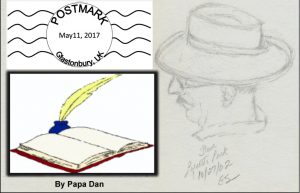
“Tell the story”
“Don’t let it be forgot”
— Arthur
…
Yet some men say
in many parts of England
that King Arthur is not dead.”
— Sir Thomas Mallory
(of Warwick?)
—————–——–Click here to download a PDF of this article: King_Arthur_for_2019_May26_2019
In dark times, we humans tend to seek assistance from some form of intervention — perhaps a knight on a horse — to save us from dangers we can’t overcome on our own. History is full of examples; and my personal favorite example is the legend of King Arthur. At its core, the Arthurian legend promises that British greatness is secure as long as its royal heritage endures. Several ancient sources contain the prophecy that the ‘Rightful King’ would reveal himself by pulling an enchanted sword from a stone. In those stories, the sword, a sword named Excalibur, had been embedded in that stone under a spell that awaited a person with enough moral courage and wisdom (and, of course, physical strength) to remove the sword and save his people at a time of great danger. In our most enduring source of Arthurian legend, Le Morte d’Artur (1485), Sir Thomas Mallory tells us that the prophecy said: “Whoso pulleth out this sword of this stone, is rightwise king born of all England.” When that ‘Rightful King’ shows up to remove the sword, they were assured that he would lead his people to victory and guarantee their long-term stability. Arthur arrived on the scene to fulfill that prophecy in the sixth century. Presumably, all of Britain’s history follows from that moment. For centuries, many storytellers have taken up the legend — recently Alfred Tennyson in Idylls of the King (in the 1860s), T.H. White in his popular book The Once and Future King (1958), and, of course, the Broadway musical Camelot by Lerner and Loewe (1960). You’ve heard the story, right?
Most of the stories come to us from the 12th thru 15th centuries, with tales of chivalry, Knights of the Round Table, and a famous Camelot love triangle involving Arthur, Guinevere, and Lancelet; but the real, historical Arthur — and there actually was one — arrived on the scene to remove the sword and save his comrades at the Battle of Camlann in 560 AD. In that battle, Arthur, with the help of the sword, Excalibur, killed their enemy, Mordred, to achieve victory. Unfortunately, accounts from that time record that Arthur was mortally wounded in that battle and was taken by the sorcerer Merlin to the Isle of Avalon to die. Historically, most believe that he was buried in the churchyard at Glastonbury Abbey (below).

BUT Arthur’s story doesn’t end there. Mallory continues: “Yet some men say in many parts of England that King Arthur is not dead, but he was taken by the will of our Lord Jesus into another place; and men say that he shall come again, and he shall win the holy cross.” The legend provides further reassurance — we are told with the particular certainty of such powerful legends, that Arthur still waits at the Isle of Avalon (now known as Glastonbury Tor) for the day when his particular combination of greatness, goodness, and magic will be needed to save Britain again from great danger. Now, partial disclosure, I have visited Glastonbury Tor here in the 21st century in October of 2003. I have walked its full extent (I have pictures, below), and I must report to you that I did not see him there. But, the legend has endured long enough and forcefully enough to suggest that I must have missed him. I can tell you from my observation, there’s magic afoot on that hillside; so, we can be confident.
 Glastonbury Tor, 2003
Glastonbury Tor, 2003
So, the legend endures. (And it’s a good story, no?)
Over the centuries since that day, Britain has survived a long list of well-documented threats;
—> —> BUT today, the time for his return has clearly arrived.
Without Arthur’s intervention, Britain may be approaching a defining ‘point-of-no-return’ if it goes through with The Brexit, its planned separation from the rest of Europe, which will precipitate disastrous results for the British economy and the stability of Europe and the West. The entire arc of history enfolding from the 6th century to the 21st has been a constant struggle to unify and stabilize Europe under strong values and alliances. That struggle has continued through an alternating series of triumphs and setbacks over sixteen centuries. We’ve seen: destructive wars, expansions of a vast British empire, contractions back to a single small country, demonstrably less worthy kings, tasteless food, a few embarrassing prime ministers (that is, most of them since Churchill), and one worthless one (the current one). Arguably, the establishment of the European Union in 1993 was the greatest single step in the progress toward Arthur’s Round Table, as told to us by a succession of storytellers to our present day. The decision is now in the hands of the current British Parliament and the Prime Minister. If this Brexit decision goes the “wrong” way, and Britain shrinks from the responsibilities of its destiny, neither Britain nor the European Union are likely to recover from such a setback. The British people will need all of the wisdom and courage that Arthur, the “Once and Future King,” can provide to step back from the Brexit cliff.
So, the time has come, Arthur, to return and fulfill your destiny. The world still waits. I’m sure you are ready and waiting somewhere on that hill in Glastonbury. Time is running out.
Or, … maybe there is another way to think about this …
According to one version of the story, on the eve of battle, Arthur gave a gift to the future
(i.e., us). He was mindful that the battle was not certain to go well, that he might not survive, and his Round Table could die with him. As he brooded over that bleak future, he was startled by a young boy who had come to fight in the battle. The boy told Arthur that he wanted to fight in the battle to preserve the values of the Round Table. The dejected King, feeling that his life’s work was about to come to nothing, was skeptical, and asked the boy how he could possibly know about the Round Table. The boy told him, “from stories people tell — stories about might for right, right for right, justice for all, a round table where all the knights would sit.”
Arthur was encouraged by what he heard and, using Excalibur, he knighted the boy, Sir Tom of Warwick, and gave him these direct orders:
“You will not fight in the battle, you will run behind the lines and hide until the battle is over; you will return home to Warwick — ALIVE! You will grow up and grow old. For as long as you live, will you remember what I, your King, tell you and will you do as I command?”
“Yes, my Lord.”
Arthur then commanded him to tell the story, strong and clear, of the values of the kingdom he had hoped to create. “Don’t let it be forgot,” he said. (Click on the link to hear Arthur tell the story himself.) As the newly knighted Sir Tom of Warwick left to fulfill his orders, Arthur’s optimism is revived that “We will be remembered” and THAT would be his victory.
So, perhaps as the Brexit decision unfolds over the next few weeks, the story must be told, “strong and clear,” again and again, that Britain has an important role to play in the future of Europe and in preserving the values for which Britain, and Arthur’s Round Table, were founded. Maybe the telling of the story can tip the balance, even if Arthur himself does not emerge from Glastonbury Tor with his sword to save Britain from itself. Maybe the telling of the story is all that is needed. Maybe that is the lesson we must take from the legend:
à if the guys with swords let us down, let’s put our faith in the storytellers. Maybe the storytellers can influence the outcome, even today.
… … An afterthought — if Arthur can save Britain from itself, so you think he can jump across the pond and save US from … well … oh, nevermind.![]()
A Guy Walks Into the Flying Pig
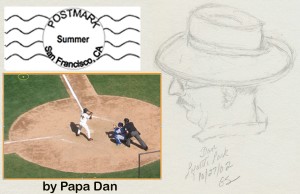
“Yes, I’ll ‘wait until next year’
and, then,
My Giants will be winners
until they aren’t.”
Click here to download a PDF of this story:
Guy_walks_into_The_Pig_Nov2_2018
= = = = = = = = = = = = = = = = = = = = = = = = = = = = = = = = = = = = = = = =
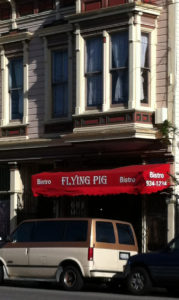
I ride the BART train to 16th & Mission. Often there’s
a guy playing music at the bottom of the escalator and
I try to drop a small token of appreciation into his
guitar case (sometimes it’s a violin case, sometimes it’s
a trumpet). Emerging from the BART station, I walk
to the intersection past some “regulars” who sit in
their usual spots, some with borrowed shopping carts, others with baby carriages filled with a variety of necessities. The opposite corner is occasionally populated by a lively “preacher” with a small appreciative audience. The block past this corner
features a grocery store with some outdoor produce
and usually one or two homeless men sleeping in
tents on the sidewalk just past the vegetables. Two
more blocks, a left turn on Van Ness, and I approach
a red awning that says “Flying Pig Bistro.”
.
.

“The Pig” makes a good impression right away
— deep and narrow, alcoves at big windows on either
side of the entrance, tables all the way down the right
side, the register and a long bar on the left with three big TV screens hanging over an excellent collection of local craft beers and California wines. The kitchen is straight out the back. The two proprietors, sons of mine, run a good shop
— extremely popular with aficionados of all sorts
of sports, excellent food and drink and comradery. Ben
and Will greet me with hugs and offer a barstool in front
of the screen where one of our favorite teams will play
in a while. It’s a sweet place to spend an afternoon and
evening. AND there are some friendly, interesting
people among the regulars.
So, on this particular afternoon, I’m sitting on my usual barstool, sipping a Sonoma County Zinfandel with my BLT (delicious on fresh Focaccia), when a guy walks into The Pig, looks around, and says to nobody in particular, “OK, this awful World Series is over and “Who Cares” anyway?! So, is there something worthwhile to watch on these big screens today?”
Like the others on the bar stools, I turned to look — at first annoyed that someone had so loudly interrupted our conversation, but then … I suddenly appreciated this guy. Yes, he was right. The World Series WAS awful. What was awful about it? Well, to start with, My Giants weren’t in it. I suppose I could express some patience and quote the title of Doris Kearns Goodwin’s wonderful memoir of growing up with baseball: “Wait Until Next Year” — BUT, she grew up a Dodger fan in Brooklyn and, well, … that’s not typically on a Giants’ fan’s reading list. On top of all that, this Series featured two teams that I would have wanted to see lose; but, in a one-on-one series, one of them has to win, right? After many years of establishing my baseball loyalty, these teams comprise my list of those that I like to see lose.
So, what’s wrong with these two teams?
The Boston Red Sox
First, the Boston Red Sox were from The American League. When I was a kid, I heard over and over that the American League was “The Junior Circuit” — never measuring up to the quality of baseball played in the National League. (You may ask: Did the fact that “My Giants” were in the National League influence that judgement? Well … uh … maybe …) In the particular case of the Red Sox, I was also taught that they were doomed to operate under “The Curse of the Bambino.” Ever since January 5, 1920, the day they sold the greatest power hitter in the history of baseball to the New York Yankees, the Boston Red Sox were destined to lose whenever it mattered. What a historic embarrassment! They sold Babe Ruth for $125,000. I mean, Ruth had led them to three World Series victories in the six years he played in Boston. On top of that, The Babe had pitched 29 2/3 scoreless World Series innings, setting a new league record that would stand for 43 years and — AND — he had broken the major league home run record in 1919 with 29 homeruns (a remarkable feat since it was still the “Dead Ball” era when the baseball was manufactured like today’s softball). He played more than 100 games in left field in addition to earning a 9-5 record as a pitcher. As of the 1919 season, he had easily surpassed Ty Cobb as baseball’s biggest attraction. BUT, that season, the Sox had stumbled in spite of him, finishing in sixth place with a 66-71 record. New ownership took over, sold the star (for money the owner used to finance a Broadway production), and proceeded to take 84 years to win another World Series. (BTW, after acquiring Babe Ruth, the Yankees ended up winning 39 AL pennants and 26 World Series titles in what became known as “The House That Ruth Built.”) “The Curse of the Bambino” that plagued the Red Sox was well deserved, and, as far as I was concerned, the fact that they finally won the World Series in 2004 hadn’t absolved them of their historic crime.
The Los Angeles Dodgers
So, why couldn’t I root for the National League’s champion? It was my own league from my own state; should be an easy choice, right?
Nope.
Since the Giants and Dodgers moved to California when I was a kid, it didn’t take long for me to decide that I had a strong loyalty to my TWO favorite teams:
1) My San Francisco Giants
and
2) Any team that happened to be playing against the Dodgers on any particular day.
So, my distaste for the Dodgers took precedence over my National League loyalty. However, here in 2018, there was no apparent way for both of teams to lose this World Series — hence my dilemma. But the World Series did end yesterday with The Red Sox dumping the Dodgers four games to one. SO, I guess I got the best half of what I wanted.
So, back to this guy who has just walked into The Flying Pig.
At The Pig
I greeted him warmly, as did Karl and James on adjacent bar stools. He introduced himself as Russel. “Welcome. Around here they call me PapaDan, This is Karl. This is James. Thanks for reminding us about the series. Don’t worry, Dodger fans won’t show up ‘til next year, if then.”
My son Ben, one of the proprietors, suggested quietly that we don’t want to piss off any customers who happen to be Dodger fans. “They are good customers; they buy plenty of beer — even if it’s just to drown their sorrows. OK?” I nodded my head in agreement. His brother Will, the other proprietor, chimed in, “Besides, the Warriors game starts in a few minutes, so you’re just in time to watch something good.” And he always seems to know the right thing to say: “Can I pour you another one of those?”
We agreed to keep our voices down on sensitive subjects. I accepted another glass of Zin; Karl and James each had another Fieldwork IPA. The “new guy” turned out to be a fervent basketball fan — an admirable quality — who appreciated the high-quality and exuberant style that the Warriors offered. He also had a refined taste in local craft beers — when he ordered an Altamont Maui Waui IPA — a number of heads turned in admiration and nodded approval.
So, the new guy settled onto a bar stool, raised his glass, and declared: “Now that all of that foolishness is over, it’s now officially basketball season.” I liked this guy. With Steph Curry and his buddies on the screen in front of us, we found we had a number of things in common:
1. That Warrior basketball was fun.
— When Steph Curry hit one of his “downtown” three-pointers, he would dance across mid-court waving his arms, not so much to call attention to himself, but to say “Look at US, all of us. We know how to have a good time out here!” Warrior fans took his jubilation to be inclusive — “We’re all having fun, aren’t we?” He was right; and those of us sitting at these bar stools were part of his “We”; especially in the comfortable atmosphere of The Flying Pig. The Warriors were proud of their unselfish approach to the game. When Steph gets in his ‘zone” and can’t miss, other players get him the ball and get out of his way. When Klay Thompson threatens to break an all-time NBA record for three-pointers in a single game, they make sure he is at the end of their typical passing barrage beyond the three-point stripe. And when the rest of team gets into a cold snap, they cheer Kevin Durant when he takes the ball the length of the court and dominates the game at both ends. They’re here for each other and that attitude rubs off on the fans in the arena and at the other end of the TV screen. Warrior basketball is about “us.”
2. And then there’s baseball. We agreed that changes in major-league baseball rules and the way the game is played have threatened to ruin the game.
— When I was a kid, and more recently, it was a major achievement for any major league pitching staff when one of their starting pitchers would “go the distance” and pitch a complete game. At the bar at The Pig, we exchanged some stories I retold a vivid memory of a night in the summer of 1963, going to bed with my transistor radio in my ear because one of the great ‘young guys,’ Juan Marichal of My Giants, was pitching against one of the great ‘old guys,’ Warren Spahn of the Milwaukee Braves. Ben and Will nodded to each other — they had heard it before. I told (RE-told) the story of the night I listened through 16 innings of shutout baseball until Mays came up in the bottom of the 16th inning and hit one out into the night for a 1-0 victory. Both Juan Marichal and Warren Spahn had pitched all 16 innings of shutout baseball until Mays sent them all home. The next morning in the Chronicle, the full story emerged. Since Marichal was scheduled to bat third in the 13th inning, Manager Alvin Dark had asked the 25-year-old if he had had enough. Marichal replied, “That 42-year-old is still pitching. I can’t come out.” So it was. Spahn, deeply depressed, was interviewed after the game, “I threw him a screwball and it just hung there. It didn’t do a damn thing!” This is a story that is no longer possible now that managers employ the “strategy” of pulling starting pitchers out after 100 pitches — even if they’re in the midst of a shutout or a no-hitter (yes, it happened this season) — intentionally depriving a whole generation of baseball fans of the kind of complete-game stories that I grew up with. (OK, so Game Three of this World Series turns out to be the exception that proves the rule, eh?) Here at the Flying Pig bar, we raised our glasses in agreement, lamenting the loss of such legends. Somebody said, “Say it ain’t so, Joe.” (Some younger guys from further down the bar, eaves-dropping on the conversation, said to each other, “Who’s Joe?”)
— And then there are the latest insulting MLB rule changes: time limits between innings, limitations on batters stepping out of the box, limits on visits to the mound by managers and even catchers … “Baseball team owners have run amuck with their rule changes., They think the game belongs to them. It doesn’t.” Glasses were raised again, “The game belongs to US!”
Somebody brought up, “And what about all the new baseball Stats? What kind of idiot wants to measure ‘Wins Above Replacement?’ Huh?” We agreed we didn’t want to talk about it — “Please bring me another one of these, will ya Will?”
OK, so I made a feeble attempt at summing up the conversation: “So, the net effect is that baseball has diminished; and given a choice between watching baseball and basketball
— a choice we have in October and again April through June — I choose basketball.”
I raised my glass and drained the last of my Zinfandel. Russel looked at me and said, “Really?” As if in response to his “Really?”, baseball stories spilled out of each one of those at the bar — some bittersweet stories about ‘what might have been’ — a small crowd gathered to listen. My last one was Willie McCovey’s final at bat in the 1962 World Series. On two consecutive pitches, Willie Mac ALMOST won it all. It’s a painful story for those of us who remember.
After the Warriors were done clobbering whoever they were playing, Russel looked at his watch, “Time to go. Gotta catch BART to Warm Springs.”
“Yeah, me too, I’m off to Pleasanton. I’ll walk you to the station.” I dropped a few bills on the bar, exchanged hugs with the guys. And we were out the door.
On the way past the tents and the sidewalk produce, just as the corner preacher was getting warmed up, Russel stopped and looked at me with both eyes. “So, you’ve been a Giants fan since you were a kid and — I’ve heard some of your stories — you watched attentively through all of their history here in San Francisco, right?
“That’s certainly true.”
“So, I understand what you said about the rule changes and the new strategies — none of it is what it used to be — but tell me straight — if Your Giants were in the World Series, how would you feel about it?”
Without hesitation, I owned up to the contradiction: “You got me. The fact that My Giants just had two really bad seasons is not the end of the world. Heck, it’s happened before and it’ll happen again. With my guys in the Series, it would be just as big a thrill as it was when I was twelve and My Giants were in the 1962 Series against the Yankees. Yes, I’ll ‘wait until next year’ and, then, My Giants will be winners until they aren’t. I guess I’m stuck with that.”
“I get it,” he said. He got on his train and I got in mine. Meanwhile, the Warriors had won, Curry had set another record, and basketball season had officially begun. And, yes, once again, baseball survived more or less undiminished.
• Willie McCovey passed away October 31, 2018 at the age of 80 •
“A ‘Hall-of-Fame Human Being” — SF Chronicle, November 1, 2018
Click here: Remembering Willie Mac: https://www.mlb.com/video/giants-honor-willie-mccovey/c-2518534883
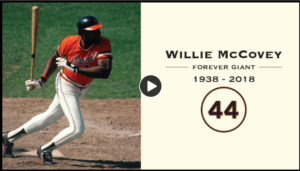
![]()
Two Writers We Know Win Awards

Last month, two writers whose work has appeared on ConVivio were awarded “Honorable Mention” in the 2018 Writer’s Digest Annual writing Contest. They were selected from among 5,300 submissions.
Click here to print a PDF of this post:
85-Two Award_winners_Sep21_2018
In this year’s annual competition:
• One poem by Lauren de Vore was selected in the “Rhyming Poetry” category.
• One short story by Dan Sapone was selected in the “Literary Short Story” category.
These two winning pieces are reproduced below.
I Wish That It Had Snowed Last Night
I wish that it had snowed last night,
That I had waked to endless white,
Perhaps a soft and muted quilt
Or shimmering like diamonds spilt,
That hides the daily muck and mess,
The faults and flaws and ugliness,
And for a fleeting hour or two
The world is virginal and new.
And if there’s like to be no snow,
I’ll wish to live where trade winds blow,
Close by the shore and crescent beach
O’erwhich the tides twice daily reach.
I’ll leave my footprints in the sand
‘Midst flotsam cast upon the strand,
Knowing the sea will wash all clean
And leave behind a beach pristine.
I wish there were somehow a way
To live again a certain day,
An hour, an instant, and undo
Those wrongs of mine, those deeds I rue.
As winter snow hides last year’s sin
And spring makes all brand new again,
I wish there were such grace for me,
Some way to set my conscience free.
But lives are more than fields and hills
O’er which fate blows where’er it wills,
And conscience can’t of its debris
Be swept clean by a foaming sea.
So sins and secrets I must bear
Till all that’s left of me is air,
And snow falls soft and white upon
An unspoiled beach at just past dawn.
—— Lauren de Vore (Janury 22, 2018)
All rights reserved
Lauren’s previous contributions on ConVivio can be found at:
https://convivio-online.net/kristof-poetry-contest/
https://convivio-online.net/guest-poet-lauren-de-vore/
https://convivio-online.net/celebrating-national-poetry-month/
= = = = = = = = = = = =
Below is “A Different Kind of September” by PapaDan
A Different Kind of September
September 15, 2015, Savelli, Calabria, Italia
The end of summer was hard to take for Giovanni. Something was missing and he knew what it was. Since he was six years old, September had always meant the summer was over and school was about to start. For years, he and his friends could conduct their September ritual of moaning about how short the vacation had been and the unfairness of being forced to return to school when it still felt like summer. In spite of that unpleasantness, at least they were returning to familiar surroundings and the same collection of friends. In those days, at least they knew what to expect from September.
Of course, by the time they all graduated from high school in 2010 and went their separate ways, everything changed. For Giovanni —everyone called him Gio — the next five Septembers had meant packing up the contents of his room in his parents’ home in Savelli and heading north for the Fall semester at the University of Salerno, about two hundred miles from home. Once he became comfortable with his life as a college student, September became familiar once again. But today, after graduating in June from Salerno’s class of 2015, all of the familiarity and certainty of September had evaporated. This was unfamiliar territory for him and he wasn’t sure how to feel about it.
Looking back, his college career had started well enough. His father had been pleased that Gio would be the first member of the Zappia family to be educated beyond high school. The general pattern for boys who grew up in this part of Calabria, near the bottom of the ‘boot’ of Italy, was to follow their fathers into one of the local factories — ironwork, stonework, heating, metal fabrication – and work their way as far up in the company as their diligence and skill would take them. But his father often reminded his son of his different vision: that Gio would come back to Savelli with a degree from the Business Studies Department at the university and rise to the upper echelon of his company’s management. It was a fairly large company and, with a degree in business, there was money to be made.
However, once Gio showed up at the university, his eyes were opened to a broader vision. It turned out that right next to the low, brick building that housed the Dipartimento di Scienze Aziendali e Ricerca (Department of Business Studies and Research) was another building that seemed more interesting on the outside and, much later, turned out to be much more interesting on the inside as well. This venerable red-tiled marble structure had a blue sign that said:
Dipartimento di Scienze Umane: Department of Humanities:
Filologia, Letteratura, Lingue, Storia Philosophy, Literature, Languages, History
Showing up for his first appointment with Professor Tommasetti, the Dean of the Business Studies Department, he paused to admire the renaissance-era structure next door, looked at his watch, and hurried into the brick building to do his duty.
Professor Tommasetti was pleasant enough; his impeccable Italian had the flowing and precise lilt of a Milanése dialect, as distinct from the more casual Calabrése sounds that Gio had grown up with. “Benvenuto, Señoré Zappia. Non ti chiamano Giovanni?”
“Mi chiamano Gio, mon Professoré,” he answered, trying to match his formality.
“Così, Giovanni, perché pensa di studiare Aziendali?”
Gio was immediately surprised by two things — he didn’t expect to be asked WHY he intended to study business and he noticed that the professor called him Giovanni even though he had just told him he was called Gio. He answered Professor Tommasetti’s question honestly: “Mio padre si auspetta che io diventi un managiatoia nella fabrica del ferro, in Savelli.” [My father expects me to become a manager in the iron factory in Savelli.”]
After looking at him awhile, the professor corrected him that he hadn’t asked why HIS FATHER wanted him to study business; he wanted to know why HE planned to do that. Gio quickly decided that the interview wasn’t going well and hoped some enthusiasm would salvage it. “Io sono il primo della mia famiglia ad andare all università.” He was proud to be the first in his family to go to the university. He thought that might help.
Professor Tommassetti changed the subject and told Gio that he would begin with introductory courses in accounting and business theory, both of which were taught in “his” building. He would also fulfill a general-education requirement in world literature — with an indifferent wave of his hand — in the building next door. He stood up and dismissed him with a gesture toward the door. “Buona giornata, Giovanni.”
“Molte grazie, professoré.” And he was, indeed, thankful to be out the door. And so, it began.
By the end of his second year at Salerno, Gio had a decision to make. During his first two years he had taken the required lower-division business courses and had filled the general education and elective slots in his schedule with courses in World Literature, Philosophy, and English as a Second Language. He enjoyed these courses and had become quite proficient in English.
Preparing for the required Spring interview with the Business Studies Department Head, Gio made three observations. First, he realized that he actually dreaded his required business courses and, whether it was the cause or the effect, he did not do well in those courses.
Second, it had not taken long for him to realize that he derived the greatest enjoyment from his English language, composition, and literature courses. He admired writers, especially the playwrights and novelists, who could make characters come to life on the page. He especially loved the characters of Shakespeare who sometimes spoke directly to the audience. Works of fiction, he was learning, were vehicles for shining light on the truth of what was going on between — and within — human beings. He hoped to write such stories and wanted to learn the techniques writers used to connect with audiences.
His third realization had come after a meeting with his English literature professor. He had gone to Professor Martelli’s office to discuss a paper he was writing about two of the plays of William Shakespeare. He knocked on the office door and found it open.
“Buon Giorno, professoré, posso entrare?” “Good day, professor. May I come in?”
“Yes, come in, but remember my rule — in my class we are studying English literature, so we must speak in English. Let us follow my rule here in my office as well. Capicé?”
“Yes, sir, Thank you. My name is Gio Zappia. I am in your Shakespeare class.”
“Yes, I remember your work. Please sit down.”
Gio began, “I noticed in ‘Romeo and Juliet’ and ‘Two Gentlemen of Verona’ that the writer seemed to know a lot about that Italian city and the history of the two famous, feuding Veronése families — the Montecchi and Cappeletti. In your lecture you mentioned that Shakespeare was born in Stratford and lived in London and there was no evidence that he ever traveled outside of his own country. I am wondering how this man who never left England in the early 16th century could know so much about a small town in northern Italy.”
Professor Martelli looked at him for a long moment and said, “Gio, you have stumbled on a controversy that scholars have debated for a long time. Some have suggested that the William Shakespeare we know from Stratford could not have written these plays. A Sicilian professor, Martino Iuvara, has written that this playwright was in fact not English at all, but Italian. He claimed to have evidence that the plays were written by a man from Messina named Crollalanza. According to Iuvara, Crollalanza fell in love with a 16-year-old named Giulietta, her parents opposed their marriage, she committed suicide, he fled to England, changed his name to its English equivalent (crolla = shaken; lancia = spear), and wrote a play about her. Professor Iuvara’s evidence includes a play Crollalanza left behind in Sicily called Tanto Traffico Per Niente.”
“Much traffic for nothing?”
“Crollalanza’s father was said to have owned a home built by a stonemason named Otelo who murdered his wife in a jealous rage. It’s all in Iuvara’s published work.”
“Then it’s true?”
Professor Martelli’s smile was kind. “It’s the most ridiculous story I have ever heard. Nobody takes it seriously. Apparently, they allowed just anybody to publish in Sicilian literary journals back in the 1950s.”
“Professor, is there a better answer?”
“I’m sorry that I can’t explain Shakespeare’s knowledge of Italy; but Senoré Zappia, you are the first student I have known here at Salerno, who has attempted to do any serious study of Shakespeare. Most of your fellow Calabrési find Shakespeare to be a challenge, so they do their best to avoid him. Your paper last month about his use of language in the history plays was remarkable. So, I have a serious question for you. Why are you pursuing your degree in the Business Department?”
After a moment Gio replied, “Professor Tommasetti asked me the same question at the beginning of my freshman year. I didn’t have a good answer for him then and I don’t have a better one for you now.”
“So, cosa pensa di fare, Giovanni?”
“I’m not sure what to do about it, professoré. My father expects me to return to Savelli with a degree in business. I suppose I have some thinking to do.”
“Yes, think about it — right after you write your paper. It is due on Monday.”
“Yes, right after. Thank you for your time. Molte grazie, professoré.”
This time, he meant it.
A month later, when the Spring term ended, the train ride home to Savelli seemed longer than it had after previous semesters. It was the usual three hours with a stopover at Lamezia; the same yellow colza blossoms typical of late spring in Calabria punctuated the broad expanse of green grass along the tracks; but none of it held his attention. All he could think about was his father’s likely reaction when he told him that a degree in Business would be a waste of time for him. Staring out the window, he rehearsed how he would introduce his idea to change his degree program to the Department of Humanities. He considered starting with his interest in English literature. Or maybe he should admit to his distaste for business. Either way, he assumed his father would be angry and disappointed. Or maybe he should try a more practical approach – he could become a teacher, and maybe, someday he could be a writer … maybe travel.
All of the conversations he imagined during the long train ride went badly. Then, on top of it all, he reminded himself that his father had arranged for a summer job at the metalworks plant; he would start on Monday. This was going to be a bad day.
His father was waiting in the car at the Catanzaro train station when Gio climbed down the steps from the platform. He put his bags in the back and settled into the front seat for the thirty-minute ride home to Savelli. Gio had finally decided that his father had never been thoughtless or harsh. He had spoken often of the life as a factory manager that he wanted for his son; but he was not stupid. Gio figured he’d just tell him the blunt truth and hope for the best. So, he set aside his fear and began, “Papa … ”; but his father interrupted by handing him a letter. It was addressed to him, Senoré Giovanni Zappia, but the envelope had been opened. His father said it was from “Profesoré Martelli,” and gestured for him to read it. Gio studied his father’s expression as Giuseppe turned the steering wheel away from the curb, trying to read his mood; but there were no visible hints. Finally, he unfolded the two separate pages. The first was a scholarship application from Il Dipartimento di Scienze Umane — the Humanities Department, the second was an offer of a part-time job working in the Department Office as a writing tutor for first-year students.
“Scienze Umane, Gio?”
“Si, Papa ‘Humanities’ en Inglese.” The professor had violated his own “rule” and both pages were written in Italian. Gio was pretty sure that he knew what Professor Martelli had intended. The letters were addressed to Gio but they were sent home three weeks ago, virtually ensuring that his father would open them. The letter suggested that Gio could have a bright future if he began preparing now for a career as a teacher, that his writing skills were exceptional. It also explained that, between the job and the scholarship, his college expenses would be fully covered. It was apparently intended to persuade Giuseppe that this was a good idea. Gio read the pages slowly, afraid to look up at his father, not sure how much trouble he was in.
Finally, he father said only, “Non è necessario decidere ancora. Dobbiamo pensare.” “No need to decide now. We will think about it.”
Gio’s reply was quick, “Si, Papa. Dobbiamo pensare.” Yes, Papa, we will think about it.
September, Once Again
The summer passed well enough; his job at the factory was all physical labor, not much thinking. It confirmed for him how much he preferred books and ideas to machines and metal; and there was free time after work for walking in the park near the Museo dell’Arte Contadina. It was a small museum with a library that focused on ancestry research and the history of the surrounding region of Calabria. The lawns and benches in the park were comfortable places to read and think about the coming school year. With the coming of September, his summer job ended and it was time to prepare to travel north to begin his third year at Salerno.
On the appointed day, in the car on the way to the train station, his father asked the question Gio had been bracing himself for: “Avete deciso?” Have you decided? He had prepared his reasons and counter arguments, if they were necessary. He began “Si, Papa … ” but again he was interrupted. Giuseppe had been thinking about it as well. He told his son that it didn’t make sense that the first member of the family to get a university education should end up working in the same factory where his father and grandfather had worked. He told Gio that he was named after his great grandfather Giovanni Ernesto Zappia. “Era analfabeta.” “He was illiterate.” He couldn’t write his own name. Giuseppe told him that if his great grandfather were alive today he would be PROUD to know that MY son might become a teacher or a writer. “FIERA!” PROUD! “Così, è deciso.” “So, it is decided.”
Gio tried not to look stunned and promised that he would do well, knowing that he was accepting a big challenge. And with the optimism of youth, he was grateful for it.
The next three years at Salerno were hard work. Changing his major to English Literature and Composition after two years put him behind in his degree requirements; so, it would take him longer to graduate. The association of other students with similar interests was worth it, and he finally felt like he was getting somewhere. He joined a group of students like himself who had an interest in writing family stories and genealogy. At the Christmas break, he came home to Savelli with his new project.
With the help of his father, his aunt Isabella, and the Museo dell’ Arte library, he was able to begin to piece together a partial family tree going back six generations of Zappias back to a Giovanna Zappia who was born in 1850. He learned that Giovanna had two children — a son, Mario, born in 1871 and a daughter named Giovanna Maria, born in 1874. Records showed that Giovanna Maria, called Maria, had two sons in Savelli before moving to Reggio, Giuseppe born in 1900 and Giovanni in 1906; but strangely, Gio found no record of them anywhere after that, and no death certificates and no record of them living in Calabria after 1910.
The Zappia lineage continued through Maria’s brother, Ernesto, and is sons — Gio’s great-grandfather Giovanni born in 1922 and Salvatore Zappia born in 1931. Gio’s own father, Giuseppe, born in 1960, was Salvatore’s youngest son.
In trying to draw the family tree, Gio was struck by two things. First, the family was a textbook case of the longstanding Italian practice of re-using first names roughly alternating through the generations. Going back the 165 years he was able to trace, he found several males named Giovanni, Giuseppe, and Mario and females named Giovanna, Isabella, Maria, and Caterina. Second, Gio’s eye kept returning to the branch of the family tree where Maria and Antonio Sapone married, had two sons, and then seemed to disappear. As Giovanni boarded the train to return to Savelli after his graduation, he was determined — there was a story to write and he was going to write it.
Back to the Present: September 2015
By the beginning of September, the summer was showing the clear signs of running out of steam. The grass in the park was dry; leaves on the trees were turning yellow; and most of his goals had been met — he had been the first to graduate from the university, he had moved beyond the family pattern of factory life in Savelli, and he found himself applying for two kinds of jobs: at the local schools and at the regional newspapers. He had been told that most job openings were expected in September. Since the summer job ended in mid-August, Gio filled his days in the park and in the ancestry section of the library with his notebook, pursuing his family-history project. Sitting at a desk in the library, Gio thought about how fortunate he was that his father was not pressuring him about his job search; but now, the pressure came from inside. He did his best to push aside his own doubts.
On one of these afternoons, he pulled out the family tree he had been working on and stared at the incomplete branches. He went to the ancestry reference desk and asked the assistant to help him look up some of his great grandmother’s “lost” relatives — Giovanna Maria Zappia and her husband Antonio Sapone. He asked her to search census and property records, death records, ship passenger lists, whatever she could find. Once she began the search, she asked an odd question. She noticed that the query he had asked for had been bookmarked. “Have we done this search for you before . . . about Sapones and Zappias?” Then her face widened as she remembered – “oh yes. It was an older gentleman, an American. Right! There is a note here that he left something behind – let me look.” She disappeared into the back office and returned with a notebook in her hand and a puzzled look on her face. “An American was here some time ago doing research on his family. His grandparents were born in Calabria and emigrated to American a little more than a hundred years ago. He was asking about Sapones and Zappias. He apparently didn’t find what he was looking for and went back to California. Unfortunately, that last day he left this notebook on the desk. We have kept it in the office in case he returned for it. It seems to contain a lot of work.” She handed him the notebook. “Do you know him?” Gio turned some of the pages and was shocked to find some familiar names. “I think we might be related.”
“If you think you might be in touch with him, perhaps you should take the notebook and return it to him. It is not doing him any good here.”
Gio placed it in his backpack and headed for home. His uncle was bringing over some clams, mussels, and calamari and his mother had promised penne alla fruita di mare. There was no way he was going to be late for that.
After dinner, when his father and uncle started arguing about politics, Gio escaped to his room and opened his backpack for a closer inspection of the notebook. It had a brown leather cover embossed with an image of some dramatic mountains and the word “Yosemite.” What he found inside was much more than he expected.
Whose Story?
The pages of Gio’s ‘lost-and-found’ notebook were nearly full — and all in English — but resembled a puzzle with some pieces missing. The first page had a name, “D. Sapone,” and “Yosemite, April 4, 2000.” The scribbling was in English and charts appeared to be pieces of a family tree with some names Gio recognized. Skimming the titles at the top of some of the pages, most of it appeared to consist of short stand-alone chapters. Three described visits to “Yosemite”; another told a story about a hike to a spectacular waterfall. Two chapters were about a restaurant in San Francisco California called The Flying Pig, owned by two brothers named Sapone. Some chapters focused on the writer’s search for details about his family going back several generations. Gio decided to read these chapters first.
Reading through the pages, he learned that the writer grew up in California — a place Gio had learned about in his American Literature courses — a region quite like southern Italy. The second thing that caught Gio’s attention was that this Californian had come to Italy in an attempt to “fill in the blanks” of his family history. And then there was a stunner: this Californian’s grandmother sailed from the port of Naples to Ellis Island in New York on August 18, 1910. She was from right here in Savelli, and her name was Maria Zappia! The owner of this notebook had come from the San Francisco Bay Area to “fill in the blanks” of unanswered questions about Maria’s family and the family of her husband Antonio Sapone, also from Savelli.
A family tree was sketched on one of the pages, showing the gaps that the writer wanted to fill, annotated with questions he wanted to answer:
— Why did they leave Italy in 1910?
— Who was on the family tree before Maria and Antonio?
He finally came to realize that the story this visitor from California was trying to write was the story of Gio’s own relatives going back more than 100 years. With some research, and by asking questions of some older family members right here in Savelli, Gio was convinced that he could complete the story this Sapone had failed to write. And what about this mystery of Antonio?
Gio turned the page from this family tree to a hand-written story that appeared to be a summary of what he had learned. This visitor from California had learned a lot; but had run into some roadblocks. And, it seems, at the end of his visit to Savelli, he had lost his notebook. As he stared at that notebook, in his imagination he could see himself retracing his ancestor’s voyage to America, meeting the American branch of his family, returning the notebook, and filling in the blanks of the story that belonged in it. He thought of the Sapone brothers who owned the Flying Pig Bistro in San Francisco. He imagined a day when he would walk into the Flying Pig, introduce himself to his relatives – HIS relatives – and say to them:
“I have a story. It started out as someone else’s story; but it turns out to be my story. I think it is your story, too. So, would you like to hear it?”
He closed the notebook, placed it in his backpack, and stared awhile at nothing in particular. What would his father say about this? He had work to do. He had a purpose. This story had been a long time coming and he was the only one who could finish it. It was time to begin.
—— Dan Sapone (2018)
All rights reserved
This story is intended as a chapter in a longer work.
The next chapter: to be continued …
La Belle Epoque: Just a Moment in Time
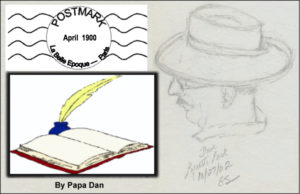
A time of optimism, regional peace, economic prosperity, the apex of social order, and technological, scientific, and cultural innovation.
I wonder what it felt like to be there, then? La_Belle_Epoque_ConVivio_Aug30_2018
On a slow-moving Tuesday afternoon in Carmel, California, Liam found himself wandering along Ocean Avenue staring into the front windows of the dozens of art galleries that brightened this otherwise foggy neighborhood. What was he doing there? The factual answer was that the company he worked for had sent its senior staff for a week-long conference by the sea to re-think some of its marketing strategies. Apparently, a secondary plan was to force the group together in an unfamiliar setting to promote some personal team building. The boss wasn’t satisfied with the way the group was functioning together and he figured that a week by the ocean in a relaxed setting with some good food and wine might loosen them up a bit. The schedule called for an agenda that sat them down in a conference room over breakfast and lunch to go through a list of issues. They had the rest of the day off. The hope was that they might spend the afternoons getting to know each other.
It didn’t sound like a bad plan, but the underlying reason the group didn’t function well together was that, at every opportunity, their conversations descended into their strong and differing opinions about the national news and politics of the day. For this little company, like so many others with an international clientele, these factors had a negative effect on their business. As a result, they had developed an unhealthy dislike for one another. So, Liam found a way to escape and wander downtown to get away from the … uh … “heat.”
Turning the corner onto Dolores Avenue, Liam found himself staring at a group of paintings in the window of one of the many neighborhood galleries. Two particular paintings had captured his attention the day before; so he returned to take a closer look. Each one was a street scene in the rain. People carrying umbrellas wound their way among horse-drawn carriages under street lamps lit early in the afternoon because of the drizzly darkness. Another painting featured a similar rain-soaked street, only the traffic consisted of turn-of-the-century automobiles. He was struck by how well the impressionist had rendered the effect of the rain on everything in the scene using oil on canvas. He found himself trying to imagine what it would have been like to walk that street at the turn of the twentieth century. A few moments later he found himself inside looking at a room full of similar images by the same artist. As a man approached him from a room in the back, Liam caught his eye and asked, “I’d love to know how he does that?”
“Sir?”
“The rain. How does he do it? I feel like I’m walking on that street and the rain is all around me. I can hear it sloshing in the street. I can almost feel the water.”
“You are very kind. I have been trying to master ‘water’ for years. I think I’ve finally gotten the hang of it. Paris around the turn of the twentieth century is my favorite time and place and she seems to look her best in the rain, don’t you think?”
“Oh, MY. YOU are the artist? An honor to meet you.” He offers his hand. “My name is Liam.”
“The pleasure is mine. My name is Edouard Cortes. [Shakes his hand.] And, yes, these are my work. If I’m not mistaken, you were in here yesterday. I appreciate your comments. And your question about the water — it turns out you can’t really paint water. Either you try to imitate how it distorts things you see through it or you try to capture things reflected in it. Otherwise, water is pretty much invisible.”
“Oh, now that you mention it, I can see that. I hadn’t really appreciated that before. I guess I hadn’t noticed. I promise not to tell anyone your secret.”
“Oh, it’s not much of a secret; but I appreciate a person willing to keep some things to themselves. You’d be amazed the kinds of things people babble about when they come in here.”
“Well, I am in a business that tries to keep some of its ideas private, ideas of a proprietary nature, if you will, so it’s not new for me.”
With a grin, “And your business is …?”
A similar grin, “Uh … private.”
And a wider grin, “Of course.”
“Mr. Cortes, I don’t want to intrude on your time; but I’d love to know what has attracted you to Paris at the dawn of the twentieth century. What is special about that time and place?”
“I don’t mind at all. It is one of my favorite topics.”
La Belle Epoque
“La Belle Epoque, in English, “The Beautiful Era,” is recognized in Western history as the period from the end of the Franco-Prussian War in 1871 to the outbreak of World War I in 1914. It was a period identified by its optimism, regional peace, economic prosperity, the apex of social order, and technological, scientific, and cultural innovation throughout Europe and America. At its peak during the first decade of the Twentieth Century, the arts flourished, especially in Paris, where many masterpieces of literature, music, theater, and visual art gained recognition. I am quick to point out, however, that “La Belle Epoque” was named in retrospect, when held in sharp contrast to the forces that led to the horrors of World War I. Nobody thought of it that way during that golden age. For a pair of generations, it was merely ‘the way we are’ and it was unconsciously expected to continue indefinitely.”
Edouard pointed at two of his paintings, Café de la Paix and le Théatre — “I hope you can see those features in the faces of the people in my paintings and feel it as the rain washes the face and streets of Paris.”
[Click to view paintings by Edouard Cortes, esp. Café de la Paix, le Teatré, Saint Denis. https://www.google.com/search?q=paintings+by+edouard+cortes&tbm=isch&tbo=u&source=univ&sa=X&ved=2ahUKEwiIssSRlZXdAhVE54MKHXPDC7IQsAR6BAgDEAE&biw=1281&bih=919]
With some effort, Liam resisted the impulse to express his distaste for the current “epoque” here in the twenty-first century and compare it to the artist’s description of La Belle Epoque, not wanting to spoil the mood. Instead, “Sir, here I can see the feelings you have described in the faces of ladies walking across the intersection in their fashionable clothes, in the posture of people going about their business, and the dignified gentlemen walking toward us here. They are clearly living in a time and place that is quite unlike my own. My own visits to Paris did not do her justice, and I believe I am seeing Paris, here, in a way I have not seen her before.”
The artist did not look away from the painting as he went on, “Twilight has always seemed to me to be the best time for Paris to show her ‘Belle Visage’ during this time in her history, whether during the Winter snows of La Madeleine or the Spring rain on Des Champs Elysées.” The orange glow from the cafés and the moving splashes of sheen in the puddles of rain on the street are not fabrications, sir; and I hope you can see them.”
Liam examines them a while. “I cannot help but wonder, Mister Cortes, how an artist like yourself, living here and now, can capture Paris of La Belle Epoque, more than one hundred years ago, with such confidence. I must add it to the list of things I don’t understand. I guess I just have to accept it as a wonder.”
The artist paused a long moment to notice the emotion in the face of his guest and, tilting his head to one side as if to get a clearer view, seemed to make a decision about him. Finally, “Sir, I have been working on another, larger piece in my private studio,” pointing to a door at the back of the gallery. “I wonder if you might be interested in taking a look. Since it has some rather unusual features, of a proprietary nature, as you say, perhaps I could show it to you.”
A Work in Progress — More Than Meets the Eye
Cortes escorted Liam to the back wall of the gallery. With a jangle of keys, he unlocked a door nearly hidden behind some shelves, gestured for him to enter, and closed the door behind them. The dark room came to life when the artist flipped a wall switch that lit a pair of spotlights embedded in the ceiling. The two beams illuminated a single painting that dominated the room. It was about six feet high, half again as wide, supported by a solid wood frame propped against the wall. The artist struck a pose with a grand sweeping gesture presenting a street scene in the rain. “It’s not quite finished, but I think you can get the idea — La Belle Epoque: Paris in 1900 in the rain. I haven’t settled on a name for it, but it depicts Porte Saint Denis.
Liam couldn’t quite see what was ‘unfinished’ about it, and it gave him the distinct feeling that the water on the street in the foreground was likely to splash onto the studio floor.
The imagery reminded him of the impressionism he was so fond of from the early twentieth century, not at all typical of the contemporary works he had seen elsewhere in other galleries on this street from his own decade. The street was littered with papers, and shiny blobs of water reflected the puddles the rain had deposited on the uneven streets. Horses pulled wagons — from tiny one-person carts to larger one-horse coaches to heavy four-horse cargo wagons. Crossing the intersection in front of him was a varied collection of Parisians — wealthy ladies dressed in the latest fashions, a baker carrying a box of baguettes to his customers, and businessmen looking important in the substantial coats and prominent hats of the day. A woman was walking toward us escorting a child across the street passing a man huddling inside a thin cloth coat against a cold, wet day. The sidewalk was quite crowded, nearly everyone wore hats — some briskly hurrying to get out of the rain, others taking their time, perhaps enjoying this important Parisian neighborhood at the height of its prosperity and peace.
Liam felt privileged to be in the company of the artist and wanted very much to say something ‘well-informed’ and appropriately appreciative. “The light! I’d love to know how you are able to show me the light shining off all of these different surfaces.” Before the artist could interject with his artistic technicalities, he continued, “but, to tell the truth, your technique is not really something I can appreciate, and I wouldn’t ask you to reveal your secrets. I am more interested in the feelings I believe I see in the faces of these people. Are they aware that they are living in this great city at such a peaceful, prosperous time? Oh, and the glow from the cafés — I’m thinking of the lives that are happening inside behind those glowing windows.”
The artist seemed pleased with Liam’s assessment. “Well, sir, you’ve hit on an important idea. These people, rich and poor like, are living at a sweet time. The poor had reason to be optimistic about their future and the rich had good reason to feel self-satisfied and secure in their privileges. Most of them had no idea of the turmoil and upheaval that was going to surround them in just a few short years that would change their lives dramatically.”
“Wouldn’t it have been sweet to stand there among them, walk those streets, hear the sound of those horses, join them in those lively cafés? I’d have some questions — how does it feel to be there on the streets of Paris during that time of such calm and stability? Do they have any sense of what is to come in just a short time? Oh, my, the light you provide in this painting makes me feel like I could be there with them.”
A Secret
Once again, the artist paused a long moment to examine the face of his guest and he seemed to confirm a judgement he had made about him. “Well, sir, I would like to invite you to do just that. There are “secrets” of a proprietary nature, as you say, that you must promise to keep to yourself. May I trust you to do that?”
“Well, yes, sir, you have my word — but I don’t know what I could possibly …”
“Here, you will need to carry this,” and the artist handed him an umbrella, picked one up for himself, put his sketchbook in a plastic bag, and gestured toward the painting. “You must step over the wood frame; and be careful, the street may be slippery. You’ll have to trust me on this. Here …” gesturing for Liam to follow him, the artist climbed over the wood frame and stepped onto the wet intersection in the foreground of the painting. Liam followed his lead and found himself standing in the crosswalk of Saint Denis. He could hear the clop of the horses strutting beside him and froze in his amazement. The artist took his arm and coaxed him across the street, over the curb, to the safety of the sidewalk. Before Liam could express his astonishment, Edouard asked him, “Do you speak any French?”
“Well, … uh … a little. I recall some from a year of college French, but …”
“That should be sufficient, we won’t be here long. The most important thing is to observe the faces and body language of the people around you. I think you will see the answers there to some of your questions.”
It was all so much to take in. Liam noticed the flowers on the corner, the woman he remembered from the painting crossing the street, the baker with his box of baguettes, and a waiter staring at the passersby from inside the café on the corner. The sign in the window said “Ouvrir.” Edouard opened the door and they walked into a warm, orange-lit café with tables set for lunch. The waiter who had been watching from the window ushered them to a table looking out on the sidewalk. He greeted them, “Bienvenue, Messieurs,” and handed them menus.
“We should order something.” Liam opened his mouth to answer, but closed it again, not quite knowing what to say. The artist spoke to the waiter, “Soup a l’oignon, un sauvignon de Bourgogne, pour deux, s’il vous plait.” And to Liam, “a little French onion soup and a white burgundy, OK?”
“Sure. Uh … “
“I know, it’s a bit much all at once. Just watch the faces and tell me what you see.”
Trying not to stare, Liam noticed two couples at the table beside them, as the waiter brought the wine and the soup. On the other side, a table with four well-dressed gentlemen who looked to be earnestly discussing business. Hats, scarves, and coats hanging on a rack beside each table. Liam and Edouard spent some time with their soup, before Edouard said, “Take your time. You wanted to know about these people. Study them. When you’ve finished your wine, we can talk about what you see.”
So, they ate their soup, drank the wine. Liam watched, thinking it over — another glass of Bourgogne. The couples came and went, replaced by two elderly ladies who had patisseries and tea. The businessmen lingered over cognac and seemed to have abandoned their business discussion and drifted to lighter topics.
Liam and Edouard spent a long afternoon watching, thinking it over, trying to take it all in. As the afternoon turned to twilight. Edouard took out his sketchbook and drew the lamppost outside the window. The rain had stopped. Finally, he paid the bill — “It’s time for us to go.”— and they walked out into the gathering dusk. “We need to find our way back and step back into our own time. But first, what did you learn?”
What Is There to Learn?
“Well, from what I could make out of their conversations, here was no politics, no economics, no troubled commentary. Faces were serious at times but nothing made them frown. Nobody seemed surprised at what they saw around them. I saw faces of people enjoying each other, not a care in the world.”
“And the ‘proper’ gentlemen?”
“Confident. Sure of themselves. On top of their game.”
“That’s a lot to derive from four hours of eavesdropping.”
“That’s true; but I’m comparing it to what I’ve experienced of four hours of my own time. What I hear consistently is disappointment, shock that things could have drifted so far wrong, surprise at what passes for ‘normal’; violence in the news every day, worry about an uncertain future — and the tense expressions on faces who have grown accustomed to all of that. I didn’t hear that here, didn’t see that.”
“Is it possible that you were looking for that result? Did you simply fulfill an expectation?”
“Sure. That’s possible. What do you think?”
The artist thought about it a while. “Well, it’s certain that most did not expect the hard times that were approaching. What you’ve described is surely a list of the differences between their time and yours. That much is well documented. I had hoped that my paintings would convey those conditions.”
Liam: “Can we bring some of it back with us?”
Edouard: After some thought … “Certainly not by merely stepping back out of my painting. You are the only one in this scene who could make such a difference — when you return.”
Returning to the rainy intersection, they stepped out of the painting, back into the studio. After standing silently for a moment, they exchanged pleasantries and thanks. Liam walked out of the gallery, giving the paintings a last glance and said “I hope to return.” He turned back to the corner of Dolores Avenue and was gone.
Returning on Friday
Friday at 2:00 pm, his week-long conference finally concluded — and with … well … moderate success — Liam hurried back down Ocean Avenue, turned at Dolores, and entered the gallery hoping to see Edouard Cortes once more before returning home. Today, however, as he walked past the paintings of Café de la Paix and Le Théatre just as they were on Wednesday, a younger, taller gentleman greeted Liam warmly. “Welcome. You are our first visitor since our remodeling project. It took longer to reopen than I had hoped; but we’re back now. Thanks for your patience.” He had a nametag reading “Alain Miller, Gallery Manager.”
“Sir, it is pleasure to be back again. I had the pleasure earlier in the week to meet Mr. Cortes,” pointing at his painting. “I have to return home today and I had hoped to say goodbye and wish him well. Is he here?”
“Well, Sir, we are indeed privileged to have two of Edouard Cortes’ originals here in our gallery. There are not many on the West Coast. I think I understand your feelings — spending time with his masterwork must surely give one the feeling of meeting him in person.”
“No, Mister Miler, I spoke to him here in your gallery and back there in his … uh …” Gesturing at the back wall, Liam was shocked to notice that the door in back wall of the room was not there where he remembered it.
The manager, with a grin — “Well, sir, I share your interest, surely; but Mr. Cortes has never been here in the U.S. He passed away in 1969 in Lagny-sur-Marne, in France, where he spent his entire life.”
For Liam, there were no words.
![]()
A Guy Walks Into a Bar
Sandburg— 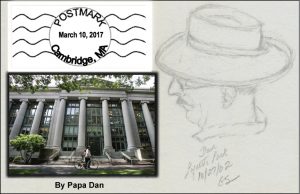 “You teach yourselves the law
“You teach yourselves the law
but I train your minds.
You come in here with a head full of mush,
and you leave thinking like a lawyer.
But … it may not be enough.”
— Professor Charles W. Kingsfield
from “The Paper Chase”
(a movie set at Harvard Law School in 1973)
Sandburg
+++++++
+++++++
Walking down Massachusetts Avenue, on his way back to his fraternity, a first-year law student found himself in the middle of an unexpected downpour without an umbrella. As luck would have it, he was passing a popular watering hole frequented by Harvard Law students and professors. From habit, he mentally acknowledged the weird fact that The Grafton Street Pub & Grille was actually on Massachusetts Avenue; but it was forgiven for its convenient location right beside Harvard Square. Gratefully, he ducked into the dark, leather-appointed bar, since he was clearly unprepared for the inclement conditions outside. He calculated that the storm was likely to continue for just as long as it would take to sit down at the bar with a class of “Maker’s Mark,” and he could be on his way once conditions had improved. Not a bad way to pass the middle of an otherwise worthless afternoon.
Apparently, others had the same idea — the place was packed. In fact, there was just one empty barstool, at the end of the bar next to an older well-dressed gentleman — probably a professor, he reasoned. So, he took his place, and signaled to the barkeep: “Makers’ Mark neat, please.”
As the drink arrived with a bowl of nuts, the gentleman to his left cast a sidelong glance at him without turning his head, “I see you were unprepared for the forecast.”
“Well, I didn’t think …”
“So I surmised,” he said without letting him finish.
“Well, sure, uh, cheers … sir.” He figured he might as well pass the time with some idle conversation. The guy seemed rude but harmless. Start with flattery. “I haven’t seen you in here before. Are you a visiting professor?”
“Visiting? I suppose one could say that. I’ve been away a very long time.”
“My name is Hart. Kevin Hart.” He extended his hand, a courtesy that was not returned. Maybe he didn’t notice, he thought. “Where have you been so long?”
“Well, young man … “ and he finally turned to look at him directly. “I don’t suppose you’ve read any Dante.”
“The Inferno?”
“Il Purgatorio. On my way up and out, hopefully, but it seems I need to pass through here first. Unfinished business, perhaps.”
Kevin didn’t quite know what to make of this. He decided to humor him. No need to be rude; and who knows, he may find himself in this fellow’s classroom one day. “What do you teach?”
“Contracts. Or so I did at one time. Clearly with less success than I had hoped.”
“I had Professor Warren for Contracts. Pretty straightforward, I thought. You say, ’With less success’ than you had hoped … Why do say that?”
“Leaving the impression of ‘pretty straightforward’ doesn’t speak well for a course of that complexity; but I have to say that the evidence suggests that I didn’t do much better. As far as I can see, the notion of ‘Contracts’ hasn’t been well-assimilated in this society. I suppose Harvard Law, AND I, have some responsibility for that failure.”
“Well, [defensively] it seems that Harvard Law has made some significant contributions, wouldn’t you say? I mean, a number of Presidents have come from here. That would seem to suggest at least some success. Obama came from here, as did both Roosevelts and Kennedy … ”
“And both Adams’,” [he makes a face], George W. Bush [sighs loudly and takes a deep drink of his whiskey], Rutherford B. Hayes [his eyes roll] … but I’m quite sure that isn’t the ideal figure-of-merit for an institution that purports to make a difference in society. There are elements of the law — especially contract law — that seem to have fallen into disrepair of late. Not sure Harvard Law, or any educational institution up and down the spectrum, can be proud of that.”
“Well, I feel the need to speak up for my school, I think I am receiving a quality education, yes, in Contracts, and other areas.
“Go ahead. [For just the second time, he turns to look at Kevin directly.] Defend your school. Tell me about Contracts.”
Now he’s on the spot … it feels like an oral exam. He waves to the bartender and points at the two empty glasses on the bar to order another round. He begins. “Written contracts are perhaps the most forceful self-managing tools in our society. We have well-established norms that are clearly enforceable and fairly efficiently litigated. Binding contracts between known entities, signed and witnessed, are … “ [He’s interrupted.]
“Let me ask you, Mister, uh …” [gestures his question as the second round of whiskeys arrives]
“Hart. Kevin Hart.” [Deflated a bit, he was just getting started.]
“Mister Hart. As you teach yourself the law, as ‘straightforward’ as you say it is, perhaps there are questions worth exploring that you, and others of recent generations, may have overlooked. Examples: Are contracts binding only on those present for, as you say, the ‘signing and witnessing?’ Must the specifics of societal agreements be written on a piece of paper? Are there responsibilities by which one generation, for example, should be held accountable to another generation? Are there values, principles, and expectations that should provide continuity and social identity in a society over time?”
In a familiar professorial speech pattern, he doesn’t wait for an answer. “I argue that there are standards of acceptable logic and quality thinking that have historically been accepted, and expected, that have all but disappeared from public and private discourse. Standards for the assumption of truth and accuracy were practiced in my day without the necessity of challenge. I assert that Americans have a collective responsibility to understand how our institutions work and to pass that understanding on to generations that follow us.”
Kevin recognizes the pedantic behavior. “My grandfather told me about a professor who said something like that to him — something about teaching himself the law — he was a tough old bird. He used to ask questions that sounded simple but tangled grandpa in knots. Said the guy made him lose his breakfast one morning.”
Kevin took advantage of a pause while both of them sipped from their glasses. He tried consciously to extricate himself from the feeling of sitting in a lecture hall and the urgent need to be taking notes; but to no avail …
“So, young man, to answer the question that is likely to be on your partially trained mind, I do feel some responsibility, shared though it is with the rest of American education and upbringing, for the fact that the quality of American decision-making has demonstrably diminished in recent years, wouldn’t you say? You pointed out that Harvard Law provided a list of American presidents, albeit of mixed quality, along with other prominent decision-makers and thought-leaders; but I assert that Harvard Law is now contributing more professionals to Wall Street that to the halls of government [rolls his eyes again.], which is not exactly a feather in its cap. I also assert that the current abominable level of intellectual application that has created your current societal disorder is the product of abysmal application of educational principles. The Socratic method of instruction, which I grew up with and which I employed during my career, is useless on an audience without the prerequisite skill in logic, knowledge of factual precedent, means and ends, and the ability to recognize and apply common sense. The absence of those attributes, among both educators and members of society writ large has led to some dismal decision-making. I read your newspaper this morning and could not believe what I was reading. It sounded like a poorly written comic novel.”
Kevin was feeling the need to say something to avoid assenting to the lecturing nature of this conversation; so, “I agree that my country has made some terrible decisions at all levels, in the halls of government, in the voting booth, as well as on the street — heck, I came out today without an umbrella, that’s what brought me in here. But I am in law school to prepare myself to do something useful — to be part of a solution. So, professor, what is your plan to mitigate all of that? You suggest that you have some responsibility to admit and some damage to repair. So, what’s your plan? Have you come back to Harvard simply to admire the problem and confess your culpability, or do you offer a solution?”
For a third time, the professor turns to address the student directly. “I have two answers. First is to attack the crisis in Civics Education. The problem is not just my complaint about Harvard Law School, the deficiency exists at all levels of education. Among the American population, knowledge of the three branches of government, how they work, why they matter, how they balance and check each other is at the lowest point in our history. Even those appointed to the highest levels of government service seem to have a dangerously unrealistic understanding of the scope of a president’s power. Equally lacking is our understanding of the importance of the news media as the backstop to protect against egregious mistakes. A public figure while I was still at Harvard Law, Daniel Patrick Moynihan, famously taught us: “Everyone is entitled to their own opinions but they are not entitled to their own facts.” America has made serious mistakes in our history, but our strength has always been in learning from them and trying not to repeat them. Right now, I warn you, because of the ignorance of our institutions coupled with an inability to recognize facts, there are serious mistakes that you will have to make, and learn from, all over again. Some of those mistakes are beginning to happen right now. Education is the only way to avoid doing that and it’s not going to be a quick fix.
“My second solution is you.” He pauses for effect, keeping his eyes on the student while he drains the last of his whiskey. “I think the best thing I can do is to turn this responsibility over to you. I’ve given you enough to proceed on your own. You have said that you plan to graduate and fulfill some dream of making a difference. We’ve identified some fields you can plow in that effort. Perhaps the challenge can be met in the field of education or rhetoric, or maybe you will be the eighth president to come from this institution. That rests squarely on your shoulders. So, now that I’ve assigned the problem to a qualified student, I think I’ve spent enough time here.” He gestures grandly at the inside of the Grafton Street Pub. “I claim that I have fulfilled the requirements of Dante’s ‘Purgatorio.’ I’m going to call it done. Let’s agree that it’s your responsibility now. Thank you for the drink and try to stay out of the rain. I wish you well Mister . . . what was it?”
“Hart. Kevin Hart. And you, professor? I didn’t catch your name.”
“Kingsfield. Charles Kingsfield.”
Click here to download a PDF of this post: Guy_walks_into_a_Bar_Mar10_2017![]()
For those interested in the need for an improvement in Civics Education in America,
a national initiative with that goal has come out of the Second Circuit of the Federal Court system.
It’s called “Justice for All.”
Take a look here: http://justiceforall.ca2.uscourts.gov/
An Election (Certainly Not Ours) — A Fable
“It’s what I DO.”
— Farley Forlock, July 2060
Click here for PDF of this post: THEIR_election_July7_2060
Not so long ago, in a country not far away, leaders of its two political parties began gearing up for their usual five-year election cycle. Halfway through the twenty-first century, the nation of Aqualandia had become justifiably proud of its new government structures. Years ago they had lengthened the presidential term to five years because, they observed, it took nearly two years to elect a president with the result that very little actual governing got done. Some elections early in the century, notably the infamous election of 2016, had been more chaotic than they preferred, so they took action to restore order and propriety to the process. After cleaning up the mess caused by the disintegration of one of the major parties, they established rules covering every eventuality: rules to qualify candidates for the national primary (they had to have significant name recognition in all three states as determined by well-regulated polling); rules ensuring that all Aqualandian residents could vote after passing a simple advertising-susceptibility test (to make sure voters would be properly informed by political advertising); rules awarding all thirty-three electoral votes from each of the three states to the candidate winning the popular vote in that state, and rules governing the three carefully timed steps to the election of a president. “The Institution,” as the rules were lovingly called, was universally admired around the world, especially in the remaining three nations of the European Union where Aqualandian principles were closely observed and often imitated.
The Three States
 After many decades of experimentation with a larger number of states, Aqualandia’s Institutional Convention structured the nation into three regional states. Every ten years, the national census would adjust the boundaries of the three states. By law, the Coastal Region, geographically split because of the propensity of the coastal areas to be influenced by “non-continental” forces, was drawn to include thirty-three percent of the registered residents who lived closest to the two coasts. The Central Region included the thirty-three percent of residents who lived between the two inland edges of the Coastal Region extending south from Aqualandia’s northern border. The Southern Region was made of the thirty-three percent of residents closest to the southern border between the Coastal and Central states. Since those three states added up to ninety-nine percent of Aqualandia residents, those citizens whose wealth placed them in the top one percent do not vote in the primary election. The logic held that those among the ‘one percent’ are less likely to be influenced by political advertising and, therefore, do not qualify as primary voters. In an Institutional provision called the Manhattan Compromise, this disparity was remedied by requiring each ‘one-percenter’ to vote twice in the general election, since they had been unrepresented in the primary process. Their campaign contributions supplemented their participation and were considered ample recompense for their sacrifice.
After many decades of experimentation with a larger number of states, Aqualandia’s Institutional Convention structured the nation into three regional states. Every ten years, the national census would adjust the boundaries of the three states. By law, the Coastal Region, geographically split because of the propensity of the coastal areas to be influenced by “non-continental” forces, was drawn to include thirty-three percent of the registered residents who lived closest to the two coasts. The Central Region included the thirty-three percent of residents who lived between the two inland edges of the Coastal Region extending south from Aqualandia’s northern border. The Southern Region was made of the thirty-three percent of residents closest to the southern border between the Coastal and Central states. Since those three states added up to ninety-nine percent of Aqualandia residents, those citizens whose wealth placed them in the top one percent do not vote in the primary election. The logic held that those among the ‘one percent’ are less likely to be influenced by political advertising and, therefore, do not qualify as primary voters. In an Institutional provision called the Manhattan Compromise, this disparity was remedied by requiring each ‘one-percenter’ to vote twice in the general election, since they had been unrepresented in the primary process. Their campaign contributions supplemented their participation and were considered ample recompense for their sacrifice.
The fact that the census changed the shape of the three states every ten years caused an ongoing joke, especially popular among Europeans and late-night talk-show hosts. The map of Aqualandia was drawn to look, alternately, like a smiling face or a frowning face, depending on the population distribution. The current host of the CBS Late Night Show said, “to get this nation smiling again, fifty million people will have to move north.”
The Two Parties
Aqualandia’s history had shown that any deviation from a two-candidate election distorted the election process and its outcome. In previous centuries, third-party candidates like George Wallace, John Anderson, and Ross Perot were found to have splintered the natural ideological distribution of the nation in ways that appeared to subvert the will of the people. So, that eventuality was prohibited. The Institutional Convention called for exactly two political parties. While there were no regional requirements for party membership, the Blue Party found its members predominantly located in the Coastal Region. The Red Party dominated the Southern Region to a large extent. The Central Region was typically found to be divided between the Blues and Reds from election to election in less predictable patterns, as were the one-percenters.
The Three Steps in Electing a President
Step One required candidates to qualify for the primary ballot in their state by uploading their name-recognition data to the secure election website using a specially designed PresElect App downloaded from iTunes. After six months of streaming YouTube, Snapchat, and TechPol appearances, that same PresElect App was used by voters in a national same-day primary election to select the candidate who would represent their party in the general election.
Step Two required party leadership to meet with the nominee to establish the priorities, policies, and values that all party members would support in ‘down-ballot’ races for the Senate, House of Representatives, the three Governorships, and local elections. ‘One-percenters’ of both parties were included among the leadership of the party of their choice, ensuring that party platforms would not violate market-based business practices.
Step Three, of course, was the general election. Given the way the intellectual competence of the electorate had evolved in recent years, it needed to be the simplest step. With only two candidates to consider and two publically-debated policy platforms to choose from, how hard could it be? It was designed to be orderly, simple, and easy to understand (even in the Southern Region). However, this particular year, 2060, has all the earmarks of being . . . well, different.
The Candidates
After a messy primary season, one candidate from The Red Party emerged with the most votes – even though nobody in the party could stand being in the same room with him. Farley Forelock appealed to voters who were unhappy with government (sort of everyone) and by insulting everyone who didn’t agree with him (sort of everyone). In his youth, he had attended a little-known university in pursuit of a double major in marketing and law (specializing in bankruptcy law). While there was no record of a degree, he learned a lot from his mentor, the founder of the university. Farley went on to make a fortune in the construction business with bombastic marketing (“We’re the best and THEY are terrible!”) and minimizing construction costs by paying as little as possible for labor and materials (“Some of our nation’s laws can be very friendly if you know how to use them”). In an undergraduate course in election law, Farley recalled writing in his notebook, “If a person is successful enough to be a credible candidate for president, why would he or she want to actually BE president? It seems like a lot of work. All I’ve ever really wanted to do is WIN!”
The Blue Party primary season was also messy. The winning candidate, Ophelia Empath had long experience in various governmental roles at a sufficiently high level to make her nomination inevitable. Her candidacy, however, was a two-edged sword. On the one hand she appealed to many Blue voters because she had high-level government experience; but she was detested by the category of voters in both parties who were unhappy with government (sort of everyone) and held her accountable for the status quo. She also had the disadvantage of being part of a political family that had a well-earned reputation for personal controversy. So, voters who sought stability were wary of a candidate who was always followed around by high drama.
Many Aqualandians were anxious to vote AGAINST both candidates. It was harder to identify many who were enthusiastically FOR either of them.
The Winning Strategy
Farley Forelock had been studying the government of Aqualandia for some time and had formulated a plan. He observed that the people did not seem capable of selecting a president who was up to the job. The increasing distaste for government and a diminishing participation in it seemed to be making that condition worse. He reasoned that somebody had to choose a president who would put the government on a stronger path. “If only I could just choose someone … “ How to do that?
Farley had made some simple observations:
- The Red Party candidates likely to run against him were weak. There were so many of them, they would divide what little support they could generate.
- Red Party voters were willing to engage in a blame game if they were persuaded by the right kind of nationalist cheerleader.
- The Blue Party candidate was surrounded by potential land mines that could derail her candidacy. A clever opponent could win if he was willing to play hardball.
- Presidents in his lifetime had entered office as vigorous men in the prime of their lives and left it as grey-haired, aging, tired men. The job was a great burden. Who would want to DO such a job? The REAL power, he imagined, would be to unilaterally select the right president and bypass the burden of office.
Using his previous theatrical experience, Farley decided to play the part of a bigoted buffoon, inciting large crowds to fear and distrust people of different backgrounds. He predicted that the undereducated population at the bottom half of the economic spectrum would blame their lack of success on others. He also reasoned that they would not be interested in the complicated analyses offered by the other party. So, he embarked on a campaign of insults, division, and over-simplification. In a party accustomed to over-simplification and finger pointing, it should be easy to win the nomination.
After the vote count, the outcome astounded everyone except Farley Forelock (“I told you I would WIN, that’s what I DO”). He was now the Red Party nominee. That was that.
Once he had won the nomination, it was time for Step Two: party unification, platform development, and the vice-presidential selection. This step was easy – he merely said “no” to every policy position the party leaders proposed and reminded them that the voters had spoken. In front of a bevy of reporters, he told them — if the party wanted to win, they had to agree with the positions he had supported during his successful primary campaign and accept his choice for vice-president. He assured them he would make his VP announcement soon. His message appeared in headlines in every newspaper in Aqualandia: “Do you want to win? Then stick with me, that’s what I DO!” Polls showed widespread support among the Reds. Party leaders had no choice but to nod their heads and wait for his VP announcement.
As he had predicted, the Blue Party nominee was lambasted for serious security violations during her government service. She didn’t go to jail but her credibility was damaged. Many public figures expressed diminished confidence in an administration headed by Ophelia Empath. So, while her name would remain on the ballot, voters began pulling away from her. That was the signal for Farley Forelock to prepare the final step of his strategy. He named his vice-president — a long-planned choice that emerged from his usual behind-the-scenes deal-making — on the last day to put a name on the three state ballots. He then flew to Scotland for an extended visit to one of his golf courses.
Everyone looked at each other – “Whuh just happened?!” Of course they couldn’t know what Farley Forelock had planned as Step Three – that would be the clincher. But that would have to wait until the proper time.
Election Day was fairly straightforward. The South and Central states both voted for Forelock, earning him 66 of the 100 electoral votes. As soon as those numbers were confirmed, the votes from Coastal Region were meaningless. One percenters were also irrelevant. Farley paused on the 13th green before putting for par. His Twitter feed from Scotland acknowledged the outcome “I told you I would win, it’s what I do.”
In fulfilling the formality required by The Institution, the electors met on December 19th to confirm the outcome. That was that.
Mystery swirled around Aqualandia’s capital in anticipation of Inauguration Day on January 20. Adding to the tension, President-Elect Forelock decided to stay overseas and conduct what was billed as a “Final Presidential Tour” of his golf courses and casinos, finalizing three deals, selling one property and buying two more. The press had questions that went unanswered – Would he be putting his properties and businesses in a blind trust as other wealthy presidents had done? Would he announce a new CEO of Forelock Enterprises? Would announce his cabinet soon? Would The First Lady begin remodeling and painting the exterior of the Presidential Estate, as he had promised, “on Day One?” However, Forelock’s usually productive Twitter account (#WEWIN) was silent. With impeccable timing, Farley’s plane touched down at JFK airport and the usual array of microphones on the tarmac awaited the new president’s first words. His orange hair blowing in the breeze, without a teleprompter, he scowled his usual scowl and said, “As I had intended from the start, I have selected the president of my choice. I hereby resign from the presidency effective immediately. The Vice President-Elect, now the President I have chosen, will be inaugurated on January 20. I accept the thanks of a grateful nation and wish the new president well.” ![]()
Thanks to Gretta for some of the key ideas and to Lauren for her Editorial expertise.
Download a PDF of this post here: THEIR_election_July7_16
A Village at a Bend in the River — A Fable
We thought that we had the answers, it was the questions we had wrong.
Bono
In school, we’re rewarded for having the answer, not for asking a good question.
Richard Saul Wurman
Once upon a time, a small village sat happily at a bend in a river that meandered through a green valley poised among some rolling hills. The shape of that bend was a pleasant feature that provided some simple benefits — boys could sit along the near bank on a summer’s day with fishing rods and catch the lazy catfish that the flow of the river generously delivered to them; holiday picnics could be set up by the wise Council of Elders in the grassy field across the river with the help of large rubber rafts; and the gentle lapping of water against the rocks on their side of the bend provided a soundtrack for wondering minds to imagine places up and down the river that they had never seen, occupied by people they had never met — for there was no reason for the people of this proudly self-sufficient village to venture beyond their field of vision, here at this bend in the river. The fields behind the village provided seasonal crops of fruit, vegetables, and other edibles year round, since they were fairly expert at rotating their well-tended fields to yield all they needed. The chickens and pigs raised in the barns at the south end of the village provided meat and eggs. They had what they needed and didn’t feel the need for more.
 One Wednesday afternoon in July, a 14-year-old boy named Tom was fishing at the bend – his feet up on a smooth rock, fishing rod in one hand and a beer can in the other (surreptitiously borrowed from his Dad’s fridge in the garage). Fish didn’t seem to be biting on this particular afternoon but, no matter, the sun was warm, the water was calm, and the beer was . . . well, it had started out cold. Tom was just about to call it a day when he noticed something floating toward him from the usual direction up the river. It was fairly large – maybe a log – nothing remarkable really; but as it got closer . . . you know when you see something unexpected that doesn’t quite fit with the surroundings and it takes a while to recognize it? It drifted right to him and bobbed gently against the rock beneath his feet. But it rolled a bit and . . .
One Wednesday afternoon in July, a 14-year-old boy named Tom was fishing at the bend – his feet up on a smooth rock, fishing rod in one hand and a beer can in the other (surreptitiously borrowed from his Dad’s fridge in the garage). Fish didn’t seem to be biting on this particular afternoon but, no matter, the sun was warm, the water was calm, and the beer was . . . well, it had started out cold. Tom was just about to call it a day when he noticed something floating toward him from the usual direction up the river. It was fairly large – maybe a log – nothing remarkable really; but as it got closer . . . you know when you see something unexpected that doesn’t quite fit with the surroundings and it takes a while to recognize it? It drifted right to him and bobbed gently against the rock beneath his feet. But it rolled a bit and . . .
Stunned, he scrambled to his feet, knocking the near-empty beer can into the river. He couldn’t quite believe what he saw – a person, or so it seemed, a man, an expressionless face . . . motionless except for the rising and falling caused by the lapping water. He opened his mouth and gasped but no sound came out. He had never seen a dead body before, but this certainly looked like one.
What to do? His eyes flashed right and left and then back to the apparition before him, his mouth still open, finally unable to take his eyes from the floating object in the water. He began to cough and then struggle for air. His arms reflexively reached for the body and then recoiled just as quickly. He wanted to yell, but this fishing spot was selected precisely because people didn’t often walk by. So, he was quite alone. A new thought was quickly dispelled — did this person need help? But he looked quite beyond help.
So, after staring for what seemed like a long time, he gingerly grabbed the nearest arm, and found it to be fairly easy to drag the rest of the floating body up on the smooth rock. Suddenly fearing he would throw up, he took some deep breaths and began to run up the bank, tripping twice on nothing in particular, looked back once more, and hurried back to town.
Half way there, still gasping, he realized that he didn’t quite know what he would do when he got there. The first person he met was Mr. Crenshaw, owner of Crenshaw & Sons Bait & Tackle, “Guess they’re not biting today, eh Tom?” And then, “You OK? You don’t look so good.”
Tom stopped, trying to catch his breath enough to talk, but all he could do was point down to the bend and gasp, and finally, “Dead! I think he’s dead! I don’t know . . . ”
“Well, now, Tom, get hold of yourself.” He put his hand on the boy’s shoulder; Tom was bent over, leaning on his knees. “What is it, boy?”
After Tom regained enough composure to recount the sparse facts, they both found their way down among the rocks to the bend. Tom stopped well short of the body and pointed. “There.”
Mr. Chenshaw tilted the body enough to see the face. “Well, yes, he’s beyond anything we can do for him. Doesn’t look familiar. I guess we’ll need some help.” Tom started scrambling again. “Tom. I don’t think we’re in a big hurry. We need some help, Tom; but he doesn’t.”
Back up at The Bait & Tackle, Mr. Crenshaw and his two grown sons pulled a plank and a tarp from the back of their flat-bed and brought the body up the bank to the truck and drove it to the fire station. Before long, the mayor, the fire chief, a police officer, and Ted Dawson from the mill gathered around the body, and reviewed the facts, as sparse as they were, and talked about what to do.
This town was proud of its ‘can-do’ attitude and believed in the principles of efficiency and well-practiced procedures that had served them so well for generations in the way they conducted their businesses, managed their homes, and taught their children. There were no problems that daunted them. When something new seemed to present a challenge, they relied confidently on established experience and sought the wisdom of the town’s Council of Elders to guide the way. The obvious decision was quickly made to respectfully bury this unfortunate visitor to their bend in the river in an unassigned section of the town’s well-tended cemetery and go back about their business. The task was completed before sundown.
As Al Crenshaw and Ted Dawson climbed out of Al’s flatbed in front of the Bait & Tackle, two boys came scrambling back from the bend with a familiar story, “Three more,” said Jack Knowland, breathlessly. Turns out that word had spread pretty fast about the morning’s surprise and a number of curious teenagers wandered down to the bend to see what they could see; and they saw more than they expected. Three more bodies had drifted into their bend in the river. Al and Ted knew what to do, got a few more neighbors to help and there were three more graves in the yard before midnight. There was the typical feeling of accomplishment from a challenge met, but as they said goodnight, the looks that were exchanged between them said, without words, “What’s going on here?” as they ambled their separate ways, home from a long day.
• • •
For most, Thursday morning started in the usual ways: Crenshaw & Son’s Bait & Tackle opened at the usual hour for those preparing for a weekend of fishing; Riverside Lumber Mill loaded a long-bed cut of pine from the woods just west of town; Barton’s Electrical had a handful of contractors preparing to install some lighting around the newly landscaped park; Dependable Building Supplies began work on a gazebo and bandstand in that park; and Europaville Coffee-n-Donuts served the usual collection of ‘to-go’ customers on their way to work along with the usual retired guys who sat their usual 90 minutes holding forth about the weather and the prospects for a good olive harvest. Donuts were still the favored breakfast, but bagels were starting to make inroads into the typical morning fare. Of course, there was some talk about the four unfortunate strangers who had to be quickly buried up the hill. Some were hearing about it for the first time. “Young Tom Egan found the first one.” It was Dave Abel: “Al Crenshaw says the kid could hardly talk he was so stunned. Thought he was going to puke. I guess he learned some grown-up things, eh?
Then, suddenly everything changed. Everything.
• • •
Mayor Bradley burst in – “Guys . . . I’m need’n’ some help. Lots o’ help. Right now, come ON!!”
What’s the matter, Jim, you look like . . .”
“This time it’s more than a dozen, come on. Right now.” Mayor Bradley never raised his voice for anything, so they knew to move. “Down to the bend. Al’s got his truck down there. It’s bad.”
On the way to the bend, they learned that fifteen more bodies had washed onto the rocks overnight. When they got there Chief Davis was clearly in charge, barking orders and making decisions. “Too many to bury individual. Gotta be common. Jake’s got his backhoe. Need to load ‘em up quick — get ‘em outta the water, fergodsake, and haul ‘em up the hill. Let’s move. This can’t wait.”
The men dispatched their assigned tasks with the same efficiency and focus as the smaller group had used on the original four the day before. It was their nature. But they didn’t have time to admire their teamwork and know-how in an emergency. By mid-afternoon the number coming down the river to settle against the rocks at the bend had doubled and they were piling up. They worked diligently to stay ahead of the flow and stack them up the hill to await the digging. By nightfall, nobody was counting. The steadiness of the volume was astounding, it just didn’t stop – until about nine when the numbers reduced to about a dozen an hour, giving them hope that they might get ahead of the task if they kept at it. Once a sizable crew had been organized and settled into a rhythm, the mayor left Ted Dawson in charge and assembled Europaville’s Council of Elders in the library for some planning.
“Gentlemen, I haven’t seen anything like it, well not since the war, but never in a town like ours. But I figure we know how to handle an emergency. Barton and Davis tell me they can fashion a conveyor. Crenshaw’s boys got Jake’s second backhoe running and figure they can dig the other side of the hill quicker and deeper where the soil’s softer. Dirt from the second set of holes can fill the first, and so on.” Decisions were made; sandwiches and water would be distributed; older guys would be rested every half hour; the mayor could be a commanding figure when there’s a need, “Barton’ll rig up some lights, we can keep it up all night if we hafta!” The mayor was conscious of the need for optimism.
Progress, even in the dark, was considerable; and in the early morning hours, under a sliver of moon, the work slowed to a halt for a few hours of rest.
• • •
Those who were thinking that the worst was over had a dramatic shock when the sun came up over the bend in the river. The cluster of bodies that had built up at the bend was an overwhelming sight, more than they had seen all day yesterday. After a few minutes of staring at the accumulation, the mayor gathered the men and a few of the teenagers, any who were within earshot, at a picnic table in the park, just a few yards from the conveyor. “Guys, we have to step this up. We’re gonna need some of you boys with us. Dawson, can you widen the conveyor? You know, double it? Barton can you get us some more power, it’s gonna have to carry some serious weight. We’ll need another patch of land for another graveyard, and we’ve got to reconsider the depth.”
The assembled group, less orderly and more breathless than the previous meeting, leaned in to study the drawing Barton was making of a structure to handle the larger conveyor, all nodding approval. Doc Samuels began a side conversation about the health issues for the water supply. Tom Egan, the boy who had found the first body, was hanging around the periphery of the meeting wanting very much to say something ‘grown up’ and maybe be of some use. He said something to nobody in particular: “God, I wish all these people could be coming down the river alive, you know?” Barton paused mid-sentence; someone said, “I just can’t imagine . . .” but Barton went back to describing how the rollers could move more weight uphill if they were double-belted. Then Tom spoke up a bit louder, surprising even himself with the forcefulness of his voice, “Hey, what if we sent someone up the river, you know, coupla guys maybe, and find out what’s killing all these people? D’ya think maybe there’s something we could do about this up there, you know, at the source?”
All three conversations stopped at once. Each of the men looked up at Tom for along moment, mostly blank expressions, some looked at each other and back at Tom, then, pretty much simultaneously, turned their attention back to the drawing of the conveyor, the electrical diagram, and the discussion of the water supply. “You know, I think we can get ahead of this with parallel crews alternating between the first hill and the second . . . Sure the water’s gonna be affected for awhile, but I think Crenshaw could fashion a filter, a FILTER, that could keep it clean enough . . . whaddayathink, Doc?”
And with the increasing magnitude of the challenge, they went on into the evening, demonstrating their optimism, stretching their capacity for an unprecedented workload, showing their ability to plan, and making use of their skills as builders, system designers, and innovators. They had elevated their response to this challenge to industrial levels of efficiency and follow-through, without asking each other questions like, “Who were these people?” “Why was this happening to them?” or “Who did they leave behind?” Meanwhile, Tom and his young friends, knowing their place, just listened . . . and learned from their elders.
![]() Download this story as a PDF: Bend_in_the_River_ConVivio_Sept2015
Download this story as a PDF: Bend_in_the_River_ConVivio_Sept2015
A Morning Conversation
It felt like the start of a workday like any other. The look and feel of my office and my desk were familiar and unmistakable. My ‘to do’ list was the usual combination of two or three quick and easy tasks, one or two difficult but do-able ones, and a handful of things that I was probably never going to get done so would still be on my list later in the week. I could still feel the optimism associated with the first hour of the day, when the phone rang.
= = = = = = =
The screen on my phone showed an area code I didn’t recognize. “Hello, this is Dan.”
“Mr. Sapone, I apologize for calling you at work, but Linked-In only showed your workplace and your switchboard operator was kind enough to put me through. My name is Aaron Sorkin. An acquaintance of mine sent me a link to a story you posted on your blog. It’s the one-act play called “Some Explaining to Do.” I was hoping to have an opportunity to talk to you about it.”
It took a long moment for all that to sink in. I understood the words all right, but it all took awhile to make sense and the voice sounded a bit distant. My mind quickly went from ‘Wow’ to ‘Ah-come-on-now,’ to ‘What is this?’ Words did eventually come out of me. I said, “OK, this is a good joke but . . . I, uh, yes I do have a blog, and . . . look, several people know how much I admire your work, well, that is, Aaron Sorkin’s work, well enough to play this trick on me — but forgive me, I don’t mean to be rude, but I have no way of knowing that you are who you say you are and I have a hard time believing that Aaron Sorkin would be calling me.”
“So you know my work?” he said.
“Of course, you . . uh, Aaron Sorkin that is, has produced and written some of the best television I have ever seen. I mean, if I had to rank all-time TV shows, well, at the top of the list there’s “The Newsroom” and then “The West Wing” and way down below that there’s everything else I’ve ever seen in my life. So, who is this really?”
“Well, Mr. Sapone, I appreciate the kind words, but I happen to be acquainted with your Poet Laureate there in Pleasanton from a writing conference she invited me to on the West Coast. You can call her and she’ll confirm that, if you like. She sent me the link to your story on your blog ConVivio, and it got my attention. It really stands out from the rest of your . . . I mean the other pieces on your blog are, well, they’re fine if a bit obvious and, I wouldn’t exactly call them trite, but well, look, I really didn’t call to insult you; but I liked the one-act play very much. It had some of the qualities I admire in American short fiction, you know, it revealed the character quickly with your dialogue, it got to some serious issues with a little humor without hitting me over the head, and it happens to be on a theme I am interested in. And starting with ‘Act One’ and ending with ‘Intermission,’ it made me want more. I mean I can really imagine that there are some interesting places to go with an Act Two and an Act Three . . . . .”
“Dan, are you still there?”
“Yes, so you’re telling me that you’re really Aaron Sorkin? Really.”
“Yes, sir, as awkwardly as I’ve introduced myself, yes, I am. Listen, I am coming out to San Francisco next month and I’d like to talk to you more about your play. For example, do you have plans to extend it? You sort of imply that you have more in your back pocket. I mean, what happens to your main character when he goes back to Earth, presumably in Act Two? And then, does he come back up there in Act Three, as you imply? And who is the voice behind the door? Does he do the ‘explaining’ that you suggest he must? I actually want to hear what he might have to say.”
I’m still finding all this hard to believe — “Well, sir, to be honest, I do have a plan for Acts Two and Three but they haven’t quite made it onto the paper, if you know what I mean.”
“Yes, Dan, I do know what you mean. It took me awhile to figure out that the whole Newsroom story was really about Charlie Skinner, not so much Will and Mackensie. I mean ‘’that’s how I got to Memphis,’ if you know what I mean.”
“Yes, I get it. I saw the final episode. And I do have answers to your questions about my main character, but . . . why exactly are you interested in my little story? I mean, you can write circles around me and what could you possibly want with my little 1500-word play?”
“Well, Dan, I am kinda between projects right now, what with ‘The Newsroom’ series all over, I’ve been wanting to do a movie and, your story got my attention. I can imagine . . .”
An annoying buzzing sound interrupts him in the background.
“Oh, excuse me, Dan . . . my other line . . . oh, I’ve got to take this, I’m really sorry. Look, can I call you back? I’ll get back to you — perhaps this afternoon — I’d like to talk some more.”
I heard a click, but the buzzing didn’t stop.
Oh, right. I suppose my alarm clock had been buzzing for a while. Of course . . . time to get up.
Download a PDF of this post: A_Call_from_Sorkin
The Saxophone Guy: Where Does It Come From?
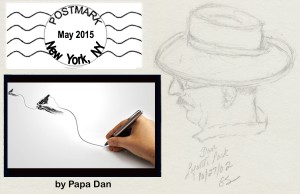 We hear evidence of him long before we see him. The long meandering notes from his saxophone alternately sprayed . . . poured . . . erupted . . . oozed . . . out of his horn in a dazzling array of colors that originated in his mind, from under his hat — a gift to anyone who happened by to hear it. But, where does it all come from?
We hear evidence of him long before we see him. The long meandering notes from his saxophone alternately sprayed . . . poured . . . erupted . . . oozed . . . out of his horn in a dazzling array of colors that originated in his mind, from under his hat — a gift to anyone who happened by to hear it. But, where does it all come from?
= = = = = = =
So, Gretta had been painting with watercolors for years and I wanted to try. Looks interesting. Gotta start with a drawing . . . saw a picture of a saxophone guy somewhere. . . figured maybe I could draw it . . . maybe. Grabbed a big piece of paper and a pencil.
Now what?
First observation: where do I start? In writing, one might just begin at the beginning — certainly at the top of the page. But this is different. Where on the blank piece of paper do I place the pencil first? Should I start with what he’s sitting on? Should I draw the guy first? And the bigger question: what do you do when you have no skill, no training, no experience?
OK, right, start with the hat.
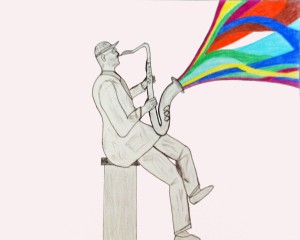 Second observation: the eraser turns out to be more important than I realized, just as useful a tool as the pencil — in my case, perhaps more useful.
Second observation: the eraser turns out to be more important than I realized, just as useful a tool as the pencil — in my case, perhaps more useful.
The shape of the jacket seems to define the guy. Pants. Spend some time on the head and face. What is he thinking? (And, if I knew, how would I show that? It’s just an outline really, after all that erasing.) Are the proportions right? I suppose. So, his clothing will have shadows, wrinkles, folds, contours, bits of shading. And shoes. What kind of shoes? Then, of course, the instrument itself has lots of curves and small features (a trumpet would have been easier). Maybe it doesn’t need so much detail.
Time to stop and take a hard look. Have I captured, or hinted at, his concentration; have I implied that he was lost in his music, enthralled by it, maybe with his eyes closed. Fingers! Have you ever tried to draw fingers? Fingers are harder than they seem. Way harder!
Take another look. OK, I’ve got a guy and a saxophone. Not too bad, I mean, you know, mostly.
Third observation: So, what’s happening in my picture? It’s just shades of gray; but now for the hard part. How do I represent the music? What does music look like? Does it change the scene? Is there a relationship between the surroundings, the way the guy looks, and the kind of music? Does the music just happen? Where does it come from?
As the artist (well, the guy with the pencil), it might be worth asking where does the drawing come from? Why am I drawing this guy? Is there something about the saxophone that appeals to me? What is it about him that got my attention? Where is he sitting? Is he on a stage? In a coffee shop? On a park bench? On a stoop in his neighborhood? Are people listening? If they are, how does it affect them? Have they chosen to sit and listen to his music or has he interrupted the quiet of their public space? I guess I’ll think about the foreground and background later.
Time for some speculation. Maybe it didn’t used to be this quiet when it was an ‘actual working-class neighborhood’ a couple of years ago, before the bottom fell out of everything. There may have been dozens of people going to and from work at several small businesses around the corner and a block over; and there haven’t been many cars on Hauser Street since the drugstore moved uptown, the grocery went out of business, and the upholstery shop closed. Not many of the garages on this block have cars in them these days; so there isn’t much traffic to interfere with the music.
Maybe he selected this spot a few months ago — as an exercise in calmness — because the configuration of these two-story wood-frame houses created a natural sound stage here in the middle of the block where the notes bounced back to him, amplifying individual notes into a more full, more dignified sound. When he closed his eyes, could he imagine a concert hall full of silent listeners enjoying the subtle combination of minor keys and alternating rhythms he was so proud of. It had been awhile since anyone actually listened to his music; so his imagination provided his only appreciative audience.
Actually, when he first selected this spot, I suppose the only audience responses he got were the “can’t you take that somewhere else?” and “Oh, no, not again” blurts from the near neighbors. But, even that reaction seems to have died away as locals stopped expecting to have any control, or even influence over their surroundings.
 His own third-floor walk-up at the corner of 14th is comfortable, if small, with a street-side window that looks out on a billboard advertising a mini-storage company. “Raising a baby in an NYC apartment is like growing an oak tree in a thimble,” it said. He still thinks of the sign as an expression of optimism; but he doesn’t notice it much lately. Three days a week he takes the bus to his job at the Laughing Cavalier where he waits tables and washes dishes. It was a bit of a shock when his hours were reduced from full time, but he learned to make do without a car; and he was amazed how much it cut his expenses. It turned out to be a decent trade-off, for now, at least.
His own third-floor walk-up at the corner of 14th is comfortable, if small, with a street-side window that looks out on a billboard advertising a mini-storage company. “Raising a baby in an NYC apartment is like growing an oak tree in a thimble,” it said. He still thinks of the sign as an expression of optimism; but he doesn’t notice it much lately. Three days a week he takes the bus to his job at the Laughing Cavalier where he waits tables and washes dishes. It was a bit of a shock when his hours were reduced from full time, but he learned to make do without a car; and he was amazed how much it cut his expenses. It turned out to be a decent trade-off, for now, at least.
Two days a week he looks at the job ads on the bulletin board at the laundromat; but that doesn’t take more than a few minutes. The newspaper says that an ‘economic recovery’ has started to show itself across the country; but he’s not sure what that is supposed to look like in his neighborhood. He typically gets to his ‘spot’ by about ten and the music begins. He plays mostly songs made-up on the spot — not so much ‘songs,’ really, as attempts to reconstruct the sounds he remembered from the days when his Dad played ‘smooth jazz’ from Pandora back when he had an iPhone. But the days of free Internet ‘Aps’ are gone. Advertising revenues that used to pay for the ‘free Internet’ are not as lucrative today as they were back in the 2020s, now that retail sales are so weak. The old notion that name recognition from website advertising contributed significantly to consumer purchasing has been all but abandoned by this time. While the commercial sector was looking for another business model to reinvigorate the value of the Internet, the consumer economy was in temporary free fall. Surely it was ‘temporary.’ Optimists believed that another innovative business model was ‘just around the corner’ and would come to the rescue as it had done back in the 20th century and early in this one. But, in the mean time, most of what used to be the middle class was just trying to survive in this new world of lowered expectations.
Our saxophone guy, while not so much an optimist, was trying to survive with his part-time job and afternoons with his music. He didn’t think much these days that he was waiting for better times to start; his is a simpler goal – just trying to find enjoyment in hearing his own music bounce back to him on this quiet street. It wasn’t so bad as long as he didn’t think much beyond the present moment. When he was a kid, he had been taught that “living in the present” was an important ‘spiritual’ value to pursue. But now, in his late twenties, it was pretty much the only practical choice for the moment.
And me, the guy with the pencil? What have I learned? I learned that our Saxophone Guy makes the music look easy even if it isn’t, and for me, drawing the picture is harder than it looks.
Download a PDF of this post: Saxophone_Guy_ConVivio_May2015
Some Explaining To Do — Act One
The Scene: The curtain opens revealing an office with a desk flanked by a small couch. The sign on the desk reads “A. Gabriel, Chief Messenger, Deputy Associate Admittance Officer.” Behind the desk is a wall with three doors. The door in the center is labeled with a “G” and is open revealing a spiral staircase The door on the right is labeled with an “Up” arrow, as an elevator might. The left door has a “Down” arrow. The Angel Gabriel sits at the desk, writing in a notebook, his famous golden trumpet resting on the desk. A Man named Anthony from the back of the audience walks up the center aisle, climbs three steps to the stage, stands at Gabriel’s desk, hat in hand, and waits.
Gabriel: [Without looking up, gestures to his left.] “Please, take a seat.”
Man: [Looks at the three doors, back at Gabriel and the trumpet, sits, places his hat beside him on the couch. After a pause] “It’s not what I expected.”
Gabriel: “I know it’s not much, but nobody else spends much time here.”
Man: [Matter-of-factly.] “No. Dying. It’s not what I expected.”
Gabriel: [Looks up.] “I suppose it never is; but to tell the truth, you haven’t actually died. Not yet.”
Man: “Well, the scene back there looked pretty … final.”
Gabriel: “I’m sure it may have seemed that way. Sometimes there are surprises.”
Man: “Surprises?” [Looks around, dismisses the idea.] “I didn’t have time to think this over much — look, I’m sure He [Pointing to the center door with the “G.”] will have some hard questions. I guess that’s what this is all about; I’m not sure I’m prepared.”
Gabriel: [He’s heard it before.] “Well, surely you knew there’d be questions?”
Man: “Yes, of course.” [Thinks about it, frowning. After awhile:] “But, you know, I suppose I’ve got some questions … for Him. He’s got some explaining to do, don’t you think?”
Gabriel: [Looking up.] “Questions? [Suppresses a grin.] You actually think you would be the one with the questions right now?”
Man: [Another pause.] “Right.” [Thinks about it some more. Takes a deep breath.] “Well, I’m not so sure. I mean, I guess I only get one shot at this … I’ve seen some pretty confusing stuff back there.” [Points toward the audience.] “You know, some things just don’t add up.”
Gabriel: “Really. And what are those things?” [Not taking this seriously.]
Man: [Very seriously.] “Well, He’s supposed to be all powerful. I mean, if a guy can create the universe and all — and don’t get me wrong it’s magnificent, and creating humans from nothing … well, OK that’s pretty awesome — I’ll give Him that.”
Gabriel: [Sarcastic.] “I’m sure your approval is appreciated.”
Man: [Getting agitated.] “Look, don’t patronize me. This is kinda new territory for me, if you know what I mean.” [Calmer, thoughtful.] “So, the things that happen back there, that must be what He intends, right? The way it happens is ‘the way it’s supposed to be,’ right?”
Gabriel: “Sure, [Quoting.]
“ ‘… in erring reason’s spite, one truth is clear,
Whatever is, is right.’ ”
Man: “Excuse me?”
Gabriel: “Alexander Pope, one of your poets.”
Man: [Not sure what to make of the Angel Gabriel quoting an 18th-century English poet, at this particular moment. Recovers his train of thought.] “I was taught that God loves each of us and created us in His image to be happy with Him [Points at the doors] forever, right?” But what about back there?” [Points to the audience.] “If taking billions of years to create the universe had the sole purpose of paving the way for us precious humans, He sure hasn’t treated us very well.”
Gabriel: “You’re complaining?”
Man: “OK, I’ve had it pretty easy.” [Taken back a bit.] “But, you know, ‘the least’ of His creatures do some serious suffering. Life’s not a bed of roses. Justice isn’t part of the deal. Love can be pretty scarce. Life didn’t come with an instruction manual. And I’m not sure I buy this idea that all of life should be some kind of test. So, is God the ultimate terrorist who threatens us all with the worst just to get what He wants? I wasn’t taught to respect that kind of thing very much. Were you?” [Realizes he may have stepped over a line.]
Gabriel: “Look, you can go on ahead if you want.” [Gestures dismissively toward the door in the center, and turns back to his notebook.]
Man: [Picks up his hat, steps toward the door.] “You know, it’s not just me. Many of us have questions.”
Gabriel: “Again, with your questions.”
Man: “There are many, questions like: ‘Where was God during the Holocaust.’ Many people think that, if a powerful God could have prevented it, a loving God would have. We’ve been taught that allowing evil to happen, if you have the power to prevent it, is the same as doing it yourself. He holds us accountable for that … so I’ve been taught. And evil like that happens every day back there. So, unless he is powerless to intervene …
Yes, I think He’s got some explaining to do.”
Gabriel: “So, you’ve got a proposal for Him?” [Gestures again to the doors.]
Man: [Defiant.] “Well, you know, I’m not so sure He’s the right one for the job. He doesn’t have much of a track record. I’m sure He takes good care of those who end up behind one of those doors, but where I come from, [Points to the audience.] He’s not much good as far as I can see. The good things I’ve seen seem to be done by people and not all of them ‘religious.’ You know, we’ve got people with hungry kids and no way to feed them; we’ve got new diseases every day; rich powerful people got it all and poor people got nothing – millions of them; we’ve got guys with guns killing kids in schools and theaters; we get, floods, famines, droughts, earthquakes; homeless people all over the place; I could go on. He doesn’t seem to be working on it.”
Gabriel: “So, you think you can do better.”
Man: “Well, better than THAT — if I had the power He’s got. If He’s all-powerful, I think He’s got some responsibility for all that. You know, it’s worse than that. [Steps closer to Gabriel.] We’ve got powerful, wealthy institutions that claim to be speaking IN HIS NAME.” [They stare at each other. Gabriel blinks.] “The vulnerable among us listen to their every word, like it is the revealed truth or something. [Notices the irony, but goes on.] Groups with power and wealth support some awful stuff and do their best to make sure that women are kept quiet and poor and have more children than they can feed. And it’s the weakest and poorest who suffer the most, you know. [Realizes he’s ranting.] The bottom line is that these things are done IN HIS NAME. I would think that He would feel some responsibility for that.”
Gabriel: [He’s heard enough, looks up.] “Since you have all the answers, maybe your time has come. Go ahead and take you chances.” [Waves at the door.]
Man: [With some trepidation, picks up his hat, decides he is ready, walks to the middle door, looks back at Gabriel, looks into the audience, and reaches for the doorknob.]
Gabriel: “I suppose there’s another option.”
Man: [Pulls back from the door.] “Another option?”
Gabriel: [Without looking up.] “Before you put it all on the line in there [Points at the door], is there something more YOU could have done?”
Man: “Well, just before I … came up here, there was a guy … well, I didn’t … he looked like he needed … I mean, you know, every day there are so many … ”
Gabriel: [Turns and looks at him directly, interrupting.] “So, what if you had the chance to make it right. Do you think you could make a difference? I mean, you know, with …” [Points at the door in the center, the one with the “G.”]
Man: “You mean I could go back?”
Gabriel: “It happens, on occasion. For a few days, maybe a week or two. Since you’re so unsatisfied with what OTHERS have done [Nods at the door in the center], I suppose you could demonstrate, you know, something better. [Turns back to his notebook] It hasn’t been long, I’m sure nobody noticed you were gone.”
As the curtain slowly begins to close — the Man steps past the curtain, down from the stage, pauses to look back at Gabriel, who isn’t paying attention to him, and walks slowly back down the center aisle. He stops half way, puts on his hat, straightens up, and walks quickly out the back of the audience.
As the Man exits the theater, the middle door, the one with the “G,” opens a crack.
Voice from behind the door: “Is he gone?”
Gabriel: [As the curtain closes.] “Yes, he’s gone; but he’ll be back and you’ll have some explaining to do.”
Intermission
A Glass of Wine Among Friends
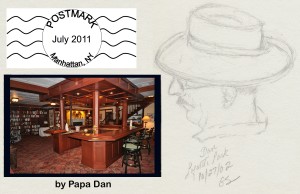 Manhattan, New York — Edward was the first to speak. “So, Walter, this is a lovely place, but why do I feel like you brought me here to steal my money?”
Manhattan, New York — Edward was the first to speak. “So, Walter, this is a lovely place, but why do I feel like you brought me here to steal my money?”
From behind a polished mahogany bar, Walter Morganstern pours dark red wine into crystal port glasses. “Eddie, you haven’t had any money since the crash of ’87, but I invited you anyway.”
Six men, four in suits, two in jeans, all except Walter in their forties, sit in Walter’s personal library — surrounded by hard bound books, some collectibles, mostly law, history, economics, and philosophy. No fiction, no paperbacks.
“Yes, but the millions he has buried in real estate are harder to steal.” This was Patrick Fitzgerald, founder of New England Energy — the youngest of the group.
“Sure, millions . . . unless he tries to sell it.” This was Al Sabo, CEO of USAMortgage. “For that you need buyers.”
“Sure, Al, but lenders like you make your fortune lending to companies who don’t need a lender — just a hiding place. I’d love to introduce you to some REAL buyers. Walter, if you didn’t have the best wine collection in Manhattan I wouldn’t have time for this. But what are these rich guys doing here? John doesn’t even drink.”
Walter places a glass of 1948 Taylor Floodgate in front of four of them, tea in front of John. “You’re all here because you have enough money to have decisions to make about this world-wide financial mess we’re in, and you’re young enough to actually care about the outcome. Pat, your twins are, what, Juniors at Yale?”
“Sophomores, and its Princeton.”
“Of course. My apologies. So for you — all of you — the future isn’t just somebody else’s problem.”
“So, what’s Al doing here?” Laughter and raised glasses all around.
“Hasn’t the mortgage crisis taught you anything? Buyers think they own things, but lenders know the truth, don’t they, Al?”
“Ah, the truth — and it ain’t pretty. So, what ARE we doing here Walter?”
“We’ve got two more guests coming before we get serious.”
“UH-oh, Walter’s going to get serious on us.”
“If you saw the label on that port you wouldda guessed something’s up. Walter, not even you can get a bottle of 1948 Floodgate for less than $800.”
“If you know your labels that well, Al, you know that the best ports drop off a cliff after 60 years. He may have paid that much for it, but he couldn’t get that much for it today. Either he’s been saving it for us or he’s unloading it on us. Which is it Walter?”
“Nothing we bought in the last decade is worth what we paid for it; and that’s part of what you’re doing here.” A buzzer sends him off to answer the door. “I’ll be back. Pour two more of those, will you Ed?”
Walter comes back with his last two guests. “Gentlemen . . . you too, Sabo . . . I want you to meet a couple of people I went to school with. Lew Frazier’s the only one of us still selling anything in this economy, owns a small chain of grocery stores in Virginia — is it six stores, Lew?”
“A dozen. People still gotta eat.”
“I think those of you who can read know Maureen. She writes for the local fishwrapper. She’s here to remind us that we guys aren’t as smart as we think we are.”
“Yes, I’ve read your stuff. You and my wife gang up on me twice a week. Tuesday and Friday, right?”
“Glad you’re paying attention.”
“Lew, Maureen, his is Albert Sabo, our own token predatory lender.”
“Ouch.”
“An endearment, Al. This is Pat Fitzgerald, he’s trying to keep us warm this winter without bankrupting us.”
“Pleased to meet you.”
“Edward Faletti is a venture capitalist. He buys small software companies and tries to call it investing.”
“Don’t you have to make a profit once in awhile to call it investing?” More laughter.
“The snide one there, that’s Dan. He’s a travel writer, sells tours to Italy, and makes fun of the rest of us. Says an economy based on products is doomed. Prefers to let other people pay his way to Europe twice a year instead. He sells experiences; says they hold their value better than commodities.”
“Sounds good to me. Walter, aren’t you going to let them sit down. Here, have a seat.” Ed hands them each a glass. “His port is better than his manners, honest.”
Walter sits on a barstool. “I suppose I could ask all of you how your businesses are doing and you’d all give me bunch of numbers. But if I asked if you were having any fun, I suppose I’d get a different answer.”
“Fun? Whoa, boy. When was that on the menu? I haven’t had ‘fun’ at work since . . . ”
“Right, you can’t remember, can you?”
Remembers. “. . . since I sold Al that bridge in . . . where was it, Al, Brooklyn?”
“OK, Walter, now that we’ve all insulted each other, what’s on your mind?”
Walter looks at each one of them. They have had some fun together over the years —and they’ve worked some serious problems. They all thought of themselves as powerful optimists, capable of making a difference when the market needed an adjustment. “So, let’s sum it up: nobody’s making any money, nobody’s having any fun, except maybe Dan here, and nobody thinks there’s much of a future for any of us. Have I got it about right?” Silent agreement all around.
“Future? It’s tough to see past the end of this bottle you’re pouring from . . . you’ve got another one around here somewhere, I hope.” Nobody laughs, so he drops the frivolity. “OK, I get it. These are hard times. But haven’t we pulled everyone out of hard times before? At least once in this very room, if memory serves, eh Walter?”
“Yes, a couple of you were here in ’87 when we pulled a few strings and got the train back on the track. And some of us know that Patrick’s grandfather sat with a similar bunch of guys at Hyde Park with Roosevelt back in the ‘30s. Each time, somebody had the foresight — and optimism — to imagine a future even though it wasn’t obvious to most people that there was one. Would it surprise you to know that I invited you here for just that reason? Who knows, if you guys are as smart as I think you are, maybe you’ll think of something that Maureen will decide is worth writing about.”
Walter peels back the first sheet on a large pad of flip charts on an easel in front of the bar and takes the cap off a blue marking pen. “Here are the kinds of ideas we’re hearing [starts writing]. Now, I think we can do better . . . perhaps we have an obligation to do better, eh?”
“Walter, forgive me . . . I know you’ve been around longer than the rest of us; but do you actually think a bunch like this can make a difference this time? The world has changed a lot, don’t you think? I can imagine what you want to do; but I’m not sure we can get there from here. We’ve heard plenty about being too big to fail, but is it possible that we’ve gotten too big to succeed?”
“When I was your age, Pat, that’s what I thought. Let me understand — you believe that the problems we have are too great, the solutions too decentralized, and the global economy is too big to get our hands around.”
“Sure, but it’s tougher than that. I recall Professor Belotti telling us back in Econ 101 that the amount of money involved in macroeconomics is only part of the story. It’s the velocity of money that is at the core of both problems and solutions.”
“So, you believe that economic activity has gotten too fast for us to influence it?”
“With respect, Walter, when my grandfather was your age, that’s what he thought. The problem with the economics at work today is that it has gotten so slow that it barely moves. Many of us in this room survived the recession, at least so far, because we do have access to cash; but the cash we can lay our hands on today is the result of slowing everything down, laying people off, stopping the supply chain, letting inventories draw down, investing in nothing — sure that gives us all a pocketful of cash; but whatta you gonna do with it? Al, here’s got money to lend, but who’s he gonna lend it to? Surely not people who are unemployed; not those facing foreclosure. Lew’s got money in the bank — but that’s because his payroll is two-thirds of what it was. Ed isn’t promoting new products because customers aren’t buying new products — heck, they’re barely buying his established products; and if they are, they’re paying bargain prices, right Ed? So, lots of the people we do business with are holding on to cash because hiring people won’t increase sales, unemployed customers don’t get excited about new products, and lending money to optimists isn’t going to reduce foreclosures and bankruptcies — we tried that, eh?”
“So, Walt, what do you think we can write on those flip charts that will get people to save more and spend more at the same time? What will we plan for the day when we wake up and realize that the federal budget goes almost entirely to pay the salaries of American employees; and budget cuts just toss them out of work? What plan can we pour out of that bottle that will get the Congress to do anything to increase tax revenues to keep paying those salaries? If we cut the budget without increasing revenue, can our unemployed workers produce products that the world will buy? How long will other countries keep lending us money when they realize that our consumers can’t afford to buy their products?”
“We can all sound pretty smart when we ask the questions, Lew; but we don’t sound so useful when we get around to answering them. The bottom line? — The one thing everybody needs is customers. Customers need to have jobs. Who has enough money to hire ten million people with little hope of return on the investment? I don’t. Do you?”
The silence was complete and prolonged. Finally, Walter put the cap back on his blue marking pen. John put down his cup of tea.
After awhile, Maureen broke the silence. “So, this is what you guys want me to write about? That you can’t get there from here?”
More silence.
“Not yet,” Walter said. “We’ve got to wait until Dan plans his next vacation — then at least we’ll know where we’re going.”
ConVivio Fiction: Imagining an Alternate History — A Teaching Job
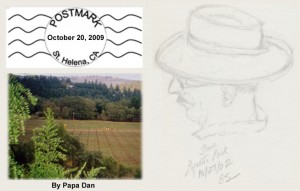
“Have you ever imagined a day that might have put you on a different path — not necessarily a better path, but one that might have been . . . well, interesting.”
Napa Valley Wine Country, California —
“Welcome. I’m happy you could come.” Here at ConVivio Winery, I like to make our visitors feel like invited guests rather than customers. The public tasting room is to the left of this brightly decorated lobby, but these guests had paid for my 3:00 pm. “Estate Tasting”; so I usher them to the right — to the richly appointed Estate Room.
Four couples select high-back oak chairs around a long oak table. I had set each place with six large-bowl wine glasses, a small water bottle, a few apple slices, a salad plate arrayed with wedges of three different aged cheeses, and a dollop of minced garlic/mushroom/olive pâté — all selected to cleanse the palate and provide transition between the wines I will offer them to taste.
Taking my place standing at the head of the table, I wait for my guests to be seated and present the six breathing bottles on the table before me with a practiced flourish. After the first few dozen times, it has become fairly routine and sometimes my mind wanders. As my guests get comfortable in their seats, I flash back over some years to the day that started it all.
∞ ∞ ∞ ∞ ∞ ∞ ∞ ∞ ∞
I came to this valley for the first time on a bus from a lesser-known winemaking region: the Santa Clara Valley. My degree in English literature from Santa Clara University had nothing to do with wine but it did prepare me for three important aspects of this job — writing, speaking in public, and teaching. Growing up, I had acquired from my dad an appreciation for good red wine and a flair for storytelling. Even today, when I wave my hand at the vines and refer to them as precocious youngsters, I realize that I am still my father’s son. After graduating and starting the obligatory search for a career in the local schools, I really just stumbled into the winery business.
Late that graduation summer, three of my buddies persuaded me to tag along on one of those wine-tasting bus tours of the Napa Valley wine country. There was little doubt that the objective was to drink as much free wine as possible without having to drive.
During the first couple of winery tours, I found several wines I liked but the uninspired guided tours, along with the alcohol, made it hard to stay awake: “Yes, here are the oak barrels,” I mimicked on the bus between wineries, “there are the stainless steel fermentation tanks, this is the bottling line, and, oh yes, here is the tasting room. Be sure to check out the gift shop.” I heard myself say, just a bit too loudly, “You know, even I could do better than THAT!”
As fate would have it, the next stop — ConVivio Winery — began as an even bigger disappointment when we piled out of the bus and no tour guide showed up to greet us. The bus driver went inside to check and came out with the news: “Sorry folks. They say the tour guide quit this morning; so there’ll be no tour. But the tasting room’s open.”
Inside the tasting room, I looked up from swirling my glass and noticed my three friends staring at me over their Zinfandel.
“What?!”
“You said you could do it, eh? ‘Better than the others’, you said.” “Well?” The voice trailed off into an accusing silence.
“Come on, that was just . . . you know . . . “
So, “I dare you” was followed by a conversation with the manager, a job application, a few phone calls and an interview over the next week; and three Saturdays later I found myself standing in front of the oak barrels teaching a group of tourists about the art of winemaking.
The job started out to have two major components. I began as the weekend tour guide and, once I learned the vocabulary of the wine business, I was responsible for writing the brochures describing each new vintage, maintaining the ConVivio website, and composing the marketing blurbs that enticed people to sign up for the guided tours and estate tastings.
After the first few months, I began to consider the job to be a teaching job and I thought I was getting pretty good at it. During the week, I took every opportunity to learn the details of the business — I talked to the grower about the vines and berries, quizzed the winemaker about blending and chemistry, and listened to the business manager talk about profit margins and market share. Being the newest employee, I often found myself unloading crates and restocking the gift shop shelves at the end of the day.
Each weekend buses would arrive, tourists would file out, my commentary became more detailed, and my “performance” became more animated. After my first harvest, I came to the conclusion that I really was good at this job and my boss, Umberto di Calabrese, seemed to agree — judging at least by the standard that he kept me around. By the time of my third pruning-to-harvest cycle, I was given the chance to conduct some of the private estate tastings offered by appointment for a fee. Soon, before I knew it, this job that I had taken as a lark was developing all the markings of a real live career.
∞ ∞ ∞ ∞ ∞ ∞ ∞ ∞ ∞
Waking up and focusing back on the long oak table, I took my first real look at the never-quite-the-same-but-always-no-different faces arrayed behind the wine glasses. “My name is Daniel. It is my privilege today to introduce you to some of our favorite wines here at ConVivio.”
During my first few tastings I tried to stick to the “lesson plan” I had prepared. I found I could squeeze quite a lot of information between the pouring and the swirling, the sniffing and the sipping. One Sunday afternoon near the end of a particularly lively session, my boss — Mr. Di Calabrese himself — came into the Estate Room and listened to the last five minutes of my “spiel.” I tried to appear not to notice him as I thanked my guests for coming and began clearing away the last of the glasses and half-empty bottles.
‘Berto, as he was called, had been born in Manarola, a small fishing village in the Cinque-Terrre on the west coast of northern Italy. He had been raised tending the terraced vineyards along the steep slopes of the coastal winemaking region famous for its Sciacchetrà — a sweet white wine typical of the Cinque-Terrre appellation. A California education had bleached out all but the barest remnants of an Italian accent and helped him graduate to the robust dry red wines that he was so proud of today. He poured himself a glass from the last of the Zinfandel and sat down at the end of the long table. “So, Daniel, what did you learn today?”
I lifted a blank look from my tray of glasses.
“Learn?”
“Yes, what did you learn? Who were your guests? Where were they from? What did they like? What did they pour out? What questions did they ask?”
I set down the tray. “Well, the couple who sat here bought a case of the ’04 Cab. The man with the German accent bought a bottle of the Merlot.”
“But that’s not what I asked you. Some people feel obligated to buy something after taking up your time, so that doesn’t tell you much. What did they think of the meritage?”
“I told them it was 60% Zin and 40% Cab Franc.”
“How did they think it compared to the ’05 or the ‘04?”
“Well, they didn’t say. I gave them a lot of the chemistry. I mentioned your barrel rotation strategy.”
During a long pause, ‘Berto looked at me, down at the wine in his glass, then back to me. His expression was kind, but I had the feeling I had said the wrong things. “Why do you think we offer these Estate Tastings? What’s in it for us, dyathink?”
My grin was my best attempt at a look of wisdom. I said, “Two reasons: to teach the tourists about our wines and to earn the thirty dollars we charge them for the tasting.”
Albert smiled a smile that DID convey wisdom and said, “When I was your age, that’s what I thought. The thirty dollars doesn’t even pay your salary and they can read the information you tell them in the brochures you write. We hand them out in the lobby, right? We do not offer the Estate Tastings to teach them anything. We offer the tastings to LEARN from them.”
Albert savored the last swallow of the Zinfandel in his glass. While I tried to hide my embarrassment, the old winemaker got up to go with a look of pleasure on his face. “Be patient with yourself. It took me ten years to learn what you learned today.”
That is my story; and some of it is true. ![]()
